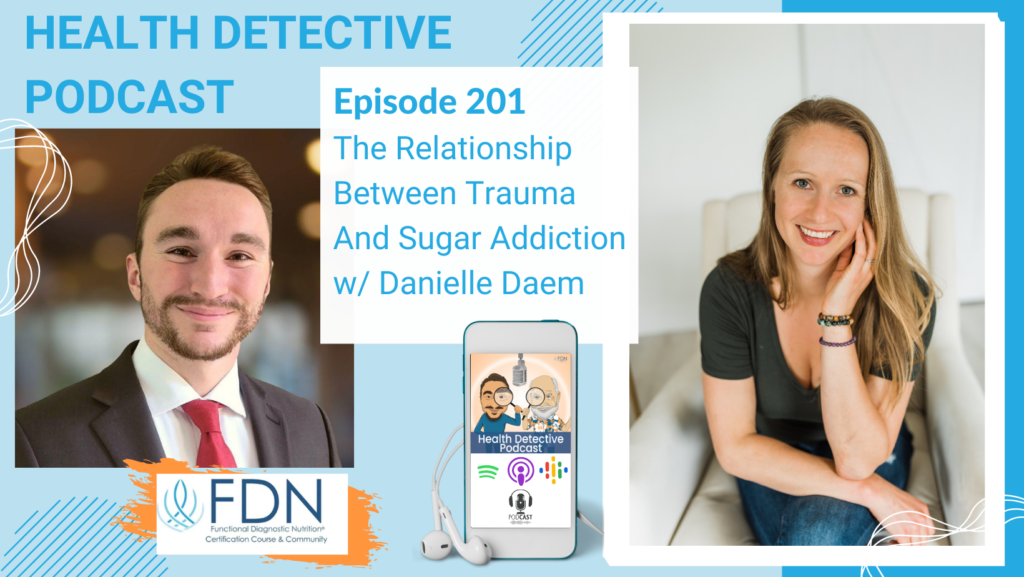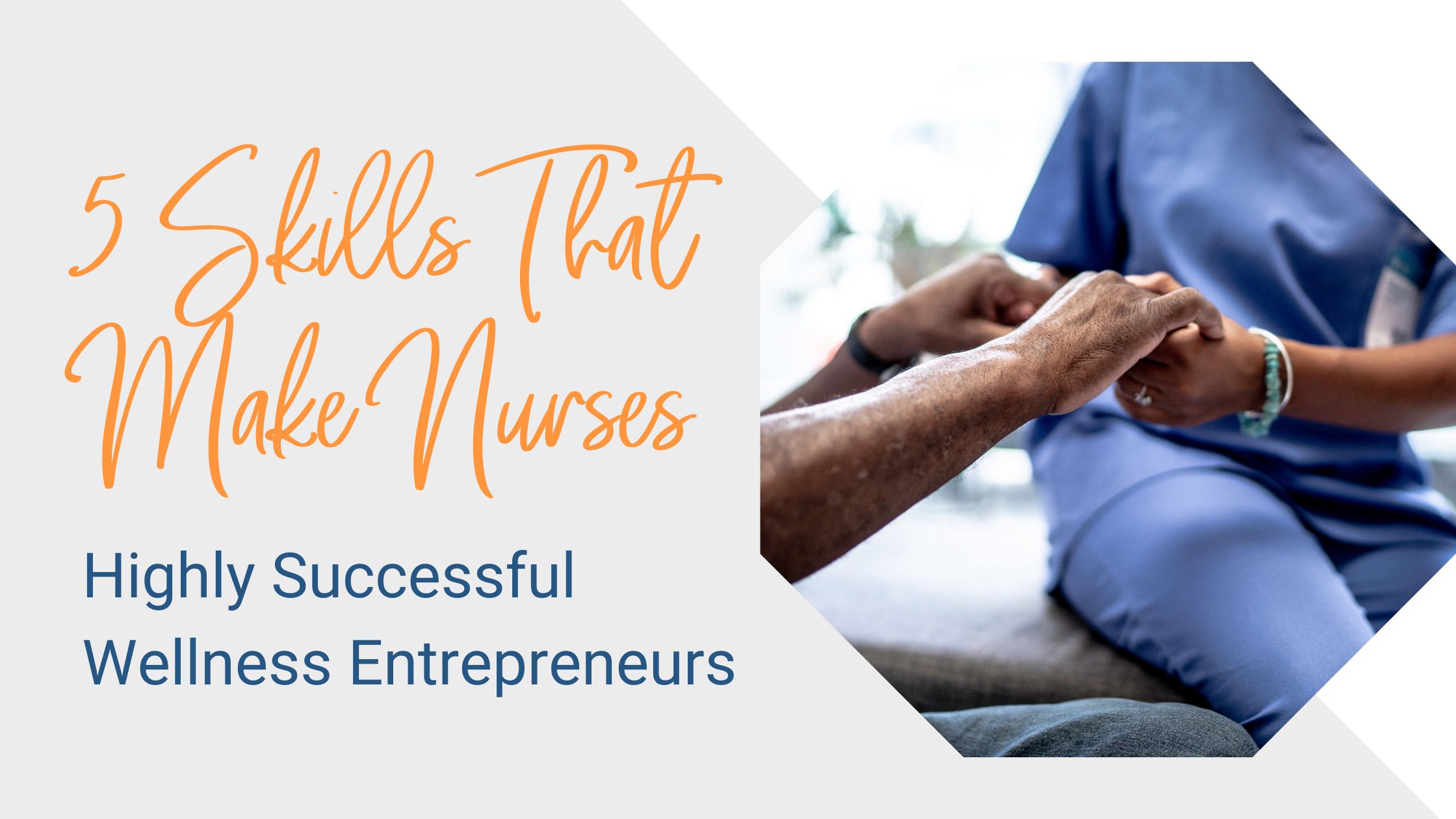Introduction
[00:00:00] Detective Ev: Well, hello my friends. Welcome back to another episode of the Health Detective Podcast by Functional Diagnostic Nutrition. My name is Evan Transue, aka Detective Ev. I will be your host for today’s show where we’ll be talking about sugar addiction and the trauma surrounding this.
If you listened to our last episode, which was the 200th Episode Special, I had said that we were going to immediately be putting out continuations of that. In the 200th episode, what we did was take the best advice from every guest we’ve ever had so far and put it into one giant compilation. I figured it might be better, more digestible for people if I do it kind of every other. We will be continuing that compilation and going through all of the people that we have talked to so far.
This one is good though, and it’s very timely around this holiday season. The guest that I have today, her name is Danielle Daem, and she is awesome. The 50 minutes flew by on this one. We actually needed a few extra minutes because I looked down and realized the time had already passed.
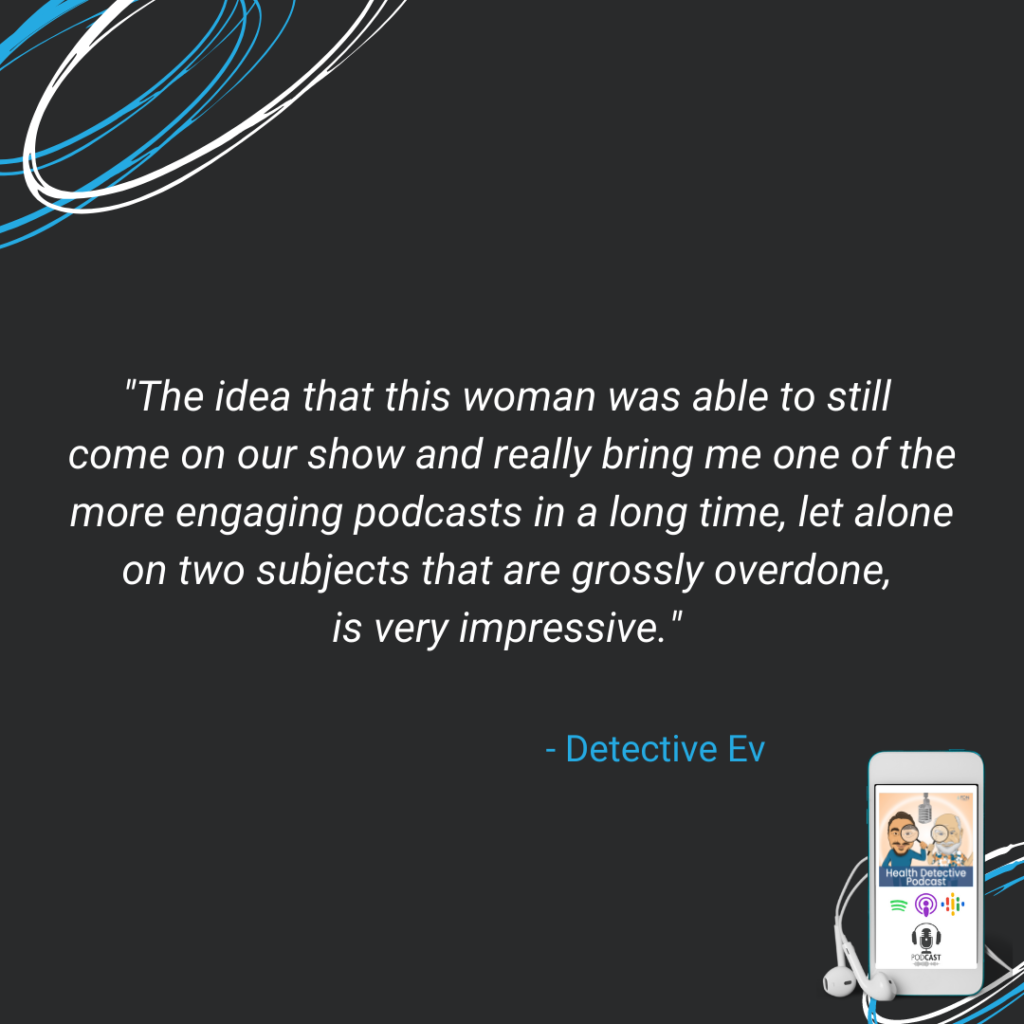
What was particularly impressive about this interview is, if you’ve been in the space for longer than a week, you really can’t not hear something about sugar, trauma, whatever. I mean, these are hot topics and they’ve been hot topics for a very long time, especially sugar. The idea that this woman was able to still come on our show and really bring me one of the more engaging podcasts in a long time, let alone on two subjects that are grossly overdone, is very impressive.
A Little About Danielle Daem
Her expertise shows throughout this, especially at the end. You’ll see her make an assumption about something that seems totally disconnected and she was a hundred percent correct. This is a real professional. You guys are going to like this. She knows what she’s talking about.
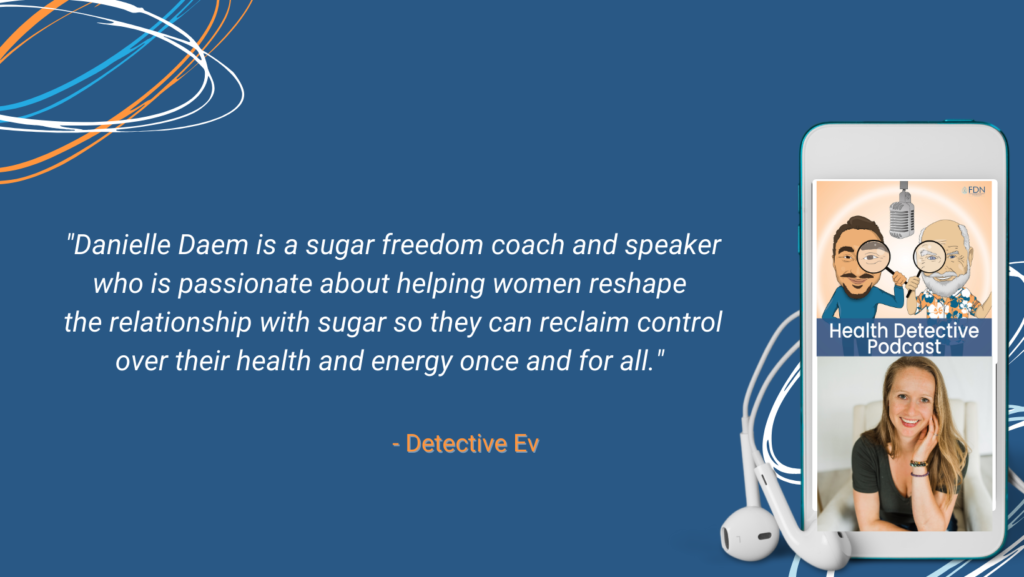
Danielle Daem is a sugar freedom coach and speaker who is passionate about helping women reshape the relationship with sugar so they can reclaim control over their health and energy once and for all. Having struggled with sugar addiction herself, she knows exactly how difficult and overwhelming the journey can be.
Using her extensive knowledge in nutrition, personal experience, and coaching, Dani helps her clients discover a new way of living in which sugar cravings and guilt no longer controls their health. She is also the host of the top-rated podcast Beyond Sugar Freedom, where she dives deep into conversations about the root causes of sugar dependency and total body health and wellness.
This is one of those there’s nothing to hype up. I want to get right into the meat and potatoes of this, no pun intended, because we’re talking about sugar and that really, okay. That was just terrible overall. I’m not going to edit it. If I do edit it, I won’t learn anything. I need to stop making those jokes.
Without further ado, let’s get to today’s episode. Alright. Hey there Dani. Thanks so much for coming on with us today.
[00:02:47] Danielle Daem: Hey, it’s so great to be here. Thanks for bringing me on.
[00:02:50] Detective Ev: Absolutely. We are pretty far apart. We got Western Canada over there, Eastern United States. Really cool. One awesome thing about the world of podcasting and just the internet in general is the fact that we can do this.
Anything Permitted Increases
We might never see each other in person but can do a 50-minute podcast together. That’s always cool. I think this is, I was saying this before we started, a very timely podcast. We’re recording this stuff about sugar during the holiday season, but there is something even worse than the holiday season, I think, at least when it comes to the sugar issues.
When we’re in the holiday season, it’s not like we necessarily, depending on how severe the person is with their health stuff and what they’re trying to accomplish, most of the time we’re not really going to recommend complete abstinence during the holidays anyway. What happens is we allow certain triggers back in.

Like for me, I’ve definitely been addicted to sugar in my life. I’ve noticed it’s almost better for me to just abstain completely because if I allow a little bit in, it’s one of those things. I always heard this saying that anything permitted increases, right? That’s both good and bad. If I permit myself to read two pages a day, it’s probably going to turn into 10. And if I permit myself to just have a little bit of sugar around the holidays, then the subsequent new year could be an issue. Now there’s nothing to look forward to. I’m kind of just sitting there.
Before we get into the how-tos and stuff like that, I want to know a little bit about you and how you got into this. Like most people that come on our show, very few people get into this specific line of work because that was their childhood dream. Most likely some things occurred that led you to doing what you’re doing now.
Trauma and Sugar: It’s a Big Part of Culture
[00:04:10] Danielle Daem: Absolutely. When I was a kid, I wanted to be a vet. I’m not doing that. I wanted to help animals, but instead I’m helping humans. So yeah, thank you for that. I’m really excited to dive into this topic.
I think, yeah, the timing of whenever this comes out is a good time. It’s always an issue. It’s always a conversation that needs to be had around our relationship to food and our addictive patterns and sugar and all the things.
You’re right. My journey to sugar and my sort of sugar wake-up kind of happened six years ago. It wasn’t in childhood. But when I look back, that’s really where my story started. I think for all of us, that’s where it starts. Definitely in childhood when we start being bombarded with all these sweet things, right?
We start just getting hooked on the sugar, even the sweet taste of our mother’s breast milk, really starting to bring us comfort and starting to have those emotional connections to food. From there it just compounds in the world that we live in every angle and every direction we look we’re being hit with it.
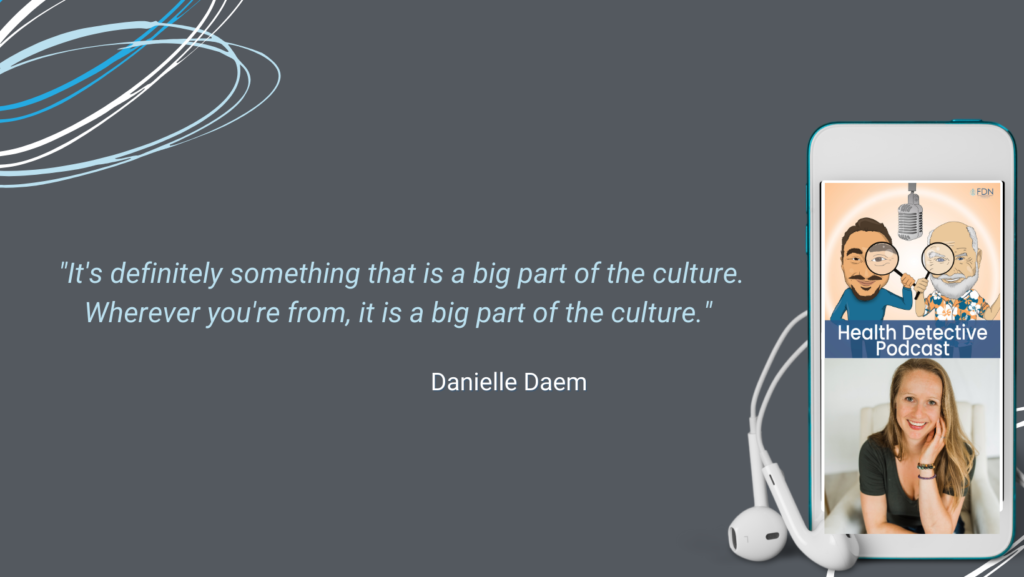
My upbringing was very typical. I was in a nuclear family. We loved sugar more so on my mom’s side of the family, like very addicted to sugar. I’m of Danish descent. If you think of Denmark, often we think of pastries and Danishes. They love sugar. That’s a fact. That’s true. I’ve been there many times. It’s definitely something that is a big part of the culture. Wherever you’re from, it is a big part of the culture.
Trauma and Sugar: Raised Eating a Lot of Sugar
Growing up in that way, looking back now, I was always addicted to sugar. I was a picky eater. Often, I joke that I only ate white things, so white bread, white pasta. I didn’t want vegetables or meat. I just wanted the cheese and the pasta and the bread and the hotdog bun with ketchup on it. Of course, all of the other more obvious sugar, the ice cream, the candy, the treats, it was a really big part of my upbringing.

That was a time when we just didn’t know what we were doing. My mom didn’t know, right? We didn’t know that it was a problem. We thought it was just how we eat, it’s delicious, and it’s good. Therefore, it must be good for us. Needless to say, I was raised eating a lot of sugar.
I’ve always been very active. I was a soccer player my whole life and I’ve always loved hiking and being outdoors and being active. Luckily, that combination helped me relatively deal, I would hope, with a lot of that sugar at a young age.
Things started really kind of shifting for me, I went off to university. Then after university, eating the typical university diet of pizza and pasta, binging on the weekends, and drinking. I went off and worked in actually one of the largest banks here in Canada and started this new phase of my life. Like, I’m going to be successful and wear high heels and be all important and do big things and help people with their money, which used to be my passion. It was in that two-year span that I worked at this place that I look back now and understand that that was really my rock bottom of emotional eating.
Trauma and Sugar: Noticing Others’ Food Related Cultures
That was a rock bottom for my addiction to sugar and processed food and using every single escape mechanism that I could think of outside of illegal drugs to numb my pain, to numb my depression, my anxiety, my total disconnection from myself and from life. I was drinking, I was eating sugar, I was binging on Netflix. I was just trying to escape life for almost that full two years because I was so miserable for many reasons, which is neither here nor there.
Luckily, both my husband and I, at the time, I say luckily because I’m very grateful that in the span of those two years, we both actually got miserable enough that we really hit the breaking point and really started tuning in and understanding that there’s more to life. We actually both quit our jobs, and this was the first of many leaps of faith.
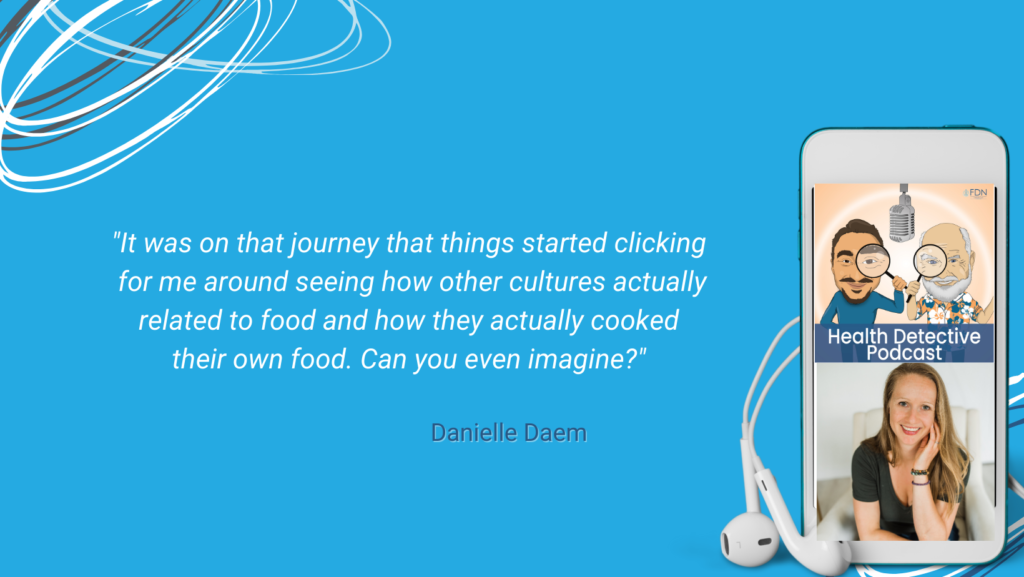
So, we quit our jobs and actually went and lived in South America for a year. We went and traveled for a year. I wanted to learn Spanish. I love travel. We both love travel. It was on that journey that things started clicking for me around seeing how other cultures actually related to food and how they actually cooked their own food. Can you even imagine?
They went to the market, they knew where their vegetables came from, they cooked. Eating out was a special occasion, not like this daily occurrence which it was for me at the time. So, just starting to really notice things as well as eating horrible myself while we were traveling on 30-hour bus rides, just eating junk.
Trauma and Sugar: Accidental Sugar Detox
Starting to notice my body really starting to slow down and starting to gain weight. Starting to notice the emotional roller coaster that I was on, how gross I was feeling in my body, how sore I was starting to feel, just all these things. At the end of that trip was really where the catalyst really started. We were, for the first time in my life, living completely off the land.
We were at a yoga retreat in the middle of the Columbian jungle of all places. I do not recommend doing your sugar detox there, but I just wasn’t aware. I didn’t know what was going on. We were living completely off of whole foods.

It was during that two-week period of time that I obviously went through a sugar detox. I went through what I call my accidental sugar detox. We both did. I remember just feeling miserable. I remember waking up in the night at weird times, being hungry, having headaches, feeling tired, even though I was literally laying in a hammock all day doing yoga and like enjoying this beautiful, beautiful nature.
My body was obviously going through some things. I had digestive problems. I had all the symptoms of withdrawal and just what my body was trying to clear out, this lifetime of processed food. So, for me, that was a huge catalyst in reflecting on my relationship with processed food and my relationship with myself.
During that trip, I also started tapping into my spirituality and my deep desire for being connected to something bigger and knowing that I am connected to something bigger. So, I started meditating, obviously learned yoga. I learned about Ayurveda and a few different things on that trip.
Trauma and Sugar: Renewed Taste Buds
Coming home, two weeks after that jungle experience, I, in my body, started noticing how my taste buds had changed. I remember having this huge list of things that I wanted to come home to Canada to have – a caramel Frappuccino from Starbucks, a toasted bagel with cream cheese from Tim Horton’s. So Canadian of me, right? I had this huge list of things that I wanted to have.
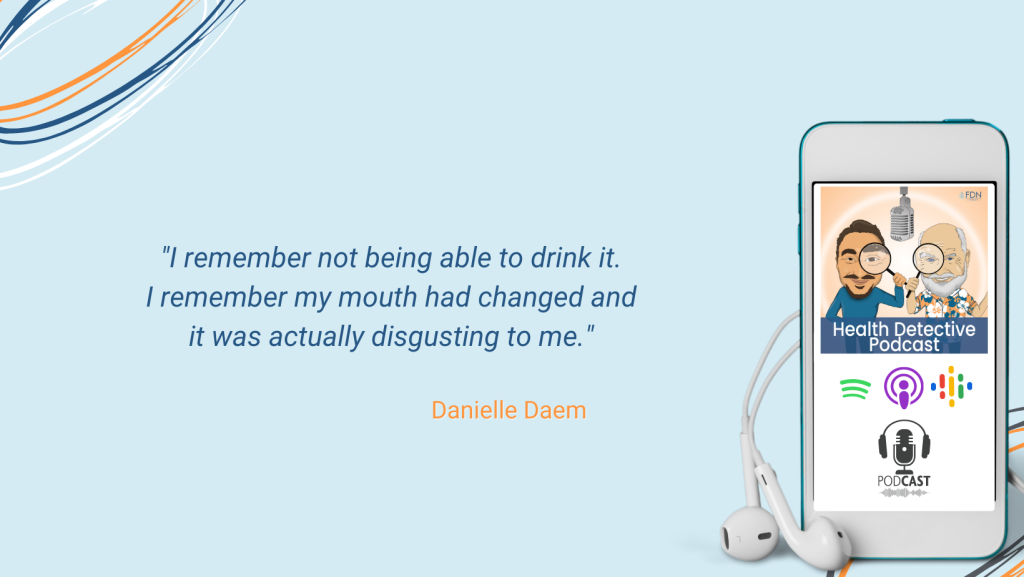
Coming home, I landed in the airport in Vancouver and had that Starbucks drink. I remember not being able to drink it. I remember my mouth had changed and it was actually disgusting to me. That was just the start of really percolating this understanding for me of these cravings and this control that sugar and processed food have had over my decisions, my life, my health, my mental capacity, and my energy, and just the control that it had over me. I started just getting curious and getting clean and wanting to eat clean.
My husband and I both went into clean eating and really wanted to get back to learning to nourish our bodies with whole real foods. Understanding that if we didn’t do that, my genetic predispositions are not the best. I’ve got some things in my family line that are not diseases that I want. That was a really big motivator for me in looking, especially at my maternal line and the genetics that I carry there.
Just seeing the list of diseases and difficulties that they struggle with and not wanting that for myself, there was a lot of reasons why I really wanted to wake up and start nourishing my body and looking after myself. Through doing that myself, obviously, entered the passion to do that for other people.
Trauma and Sugar: Assumed it Was a Sickness
It’s changed my life, right? It’s absolutely changed the way my body looks and feels, my relationship with myself, my ability to slow down and not live in a stress state all the time, to not need something outside of myself to cope or get through and to numb out and escape difficult emotions. Just all the beautiful gifts that I’ve given myself of this inner work as I’ve been healing over the last six years myself.
[00:11:15] Detective Ev: Awesome! There’s a lot to unpack here. I want to start with actually something relatively simple. I’m not clear on this. When you were experiencing what clearly is withdrawal from the sugar stuff as you’re doing that kind of retreat, more or less, were you instantly aware that this was related to the food, or did you not understand why you felt bad at the moment?

[00:11:33] Danielle Daem: Not at all. I had no idea what was going on. This is all hindsight for me because I didn’t know that it was a problem until I got it out of my system. That’s why I call it an accident. Cause I was totally not aware of what was going on.
I thought I was sick. I thought there was something wrong with me. It didn’t help that at the tail end of that, we both actually got a parasite from drinking the water. So, then we were just catapulted into absolute terror of how we felt and how we were healing.
When we came home to Canada, it was just that catalyst to get us to clean up our diet. We’d gained weight. We done all these things, so we wanted to just get clean, both of us.
Withdrawal Symptoms can be Elusive
That was really where I started clicking, oh, that’s what happened. I started learning about sugar. I took my education as a holistic nutrition coach, and I started learning about that. For myself, started putting those dots together, like, oh, that’s what was going on there. I was getting off the processed crap.
[00:12:20] Detective Ev: Gotcha. I was curious about that cause the way that you described it, it did sound like this incremental realization. But I couldn’t tell if in those initial stages there was any awareness of this.
I imagine how many people out there might unintentionally, I mean, not the exact situation, but they might unintentionally be going through similar things to this, but they would never register it as withdrawal symptoms.
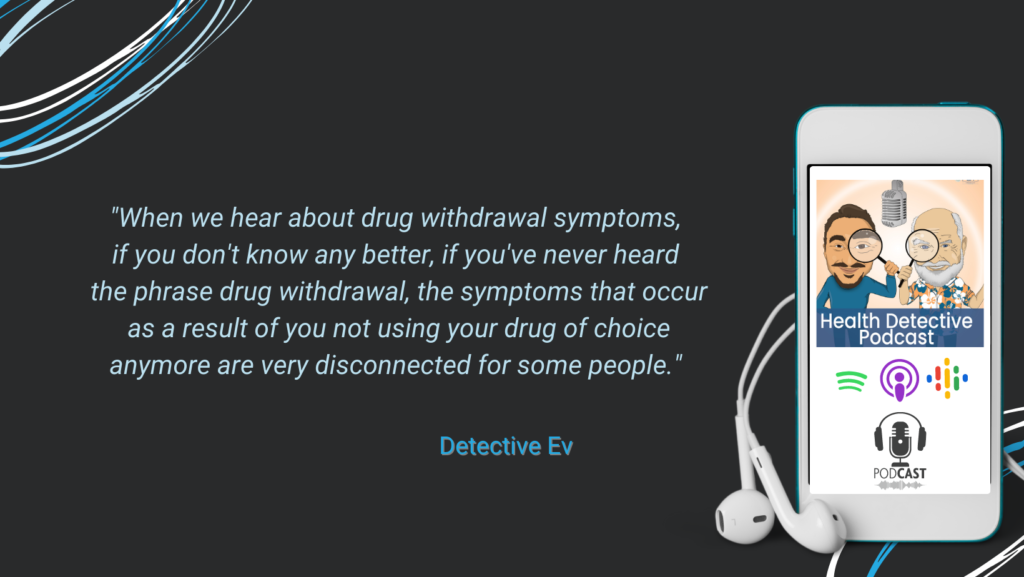
I’m in the mental health space as well. When we hear about drug withdrawal symptoms, if you don’t know any better, if you’ve never heard the phrase drug withdrawal, the symptoms that occur as a result of you not using your drug of choice anymore are very disconnected for some people. If you had no education around that, you’d be very confused as to what is happening to you.
Now I’m thinking about all the people out there, even maybe myself in the past, I’m wondering how fast this sets in. I’m like, well, what if I just went a day unintentionally without sugar and I was addicted to it before? Am I having a terrible day not really realizing that I’m actually withdrawing from sugar?
Do you recall? How fast did it happen? Was it one day of this, couple days, three days?
Trauma and Sugar: Pretty Quick, Weird Symptoms
[00:13:18] Danielle Daem: Really great question. I’ll come back to that in a second. I just want to comment.
Totally, I get what you’re saying. It’s very rare, I feel like. I’ve never met somebody who would go into an accidental sugar detox withdrawals without knowing it. For most people, sugar is there until we actually get aware and conscious and make the choice to go off of it.
It’s sneaky. It’s in everything. That’s not the case for a lot of your listeners who are hopefully now on whole, real foods and really nourishing their body. But most people I find, I mean, you would obviously be able to speak to this more, but even with drugs, right?
There’s almost this like, I know I’m going to go off coffee. I know I’m going to go off this other drug of choice. Kind of being intentional with that does definitely call for needing to prepare yourself and having hopefully the right support and somebody to guide you through what to expect.
Even my clients in my programs who come in, we spend a couple weeks getting ready before actually withdrawing and detoxing from sugar. Even then I prepare them and there’s always surprises that come up. Like, why do I feel like I have the flu, or my bones are aching, or I feel more moody than normal. It’s all part of the journey.

To come back to your question, looking back, it was definitely within a few days for me personally. I would say maybe two or three days I started noticing like lower energy and weird symptoms and those things turning to come on for me. A lot of my clients, it is definitely within the first few days or that week. It’s very different, right?
Trauma and Sugar: Bio Individuality and Frequency of Use Matters
For some people, it could be one day without sugar they’ll notice it big time, right? And some people may not notice a day without sugar. I think it really depends on, obviously all of our bio individuality as well as how much sugar you’re actually eating in a day.
If you’re eating 500 grams of sugar every single day and then you go off it, you’re probably going to notice some big symptoms. You’re probably going to be hungry all day. You’re going to be exhausted. Your body’s going to be confused.
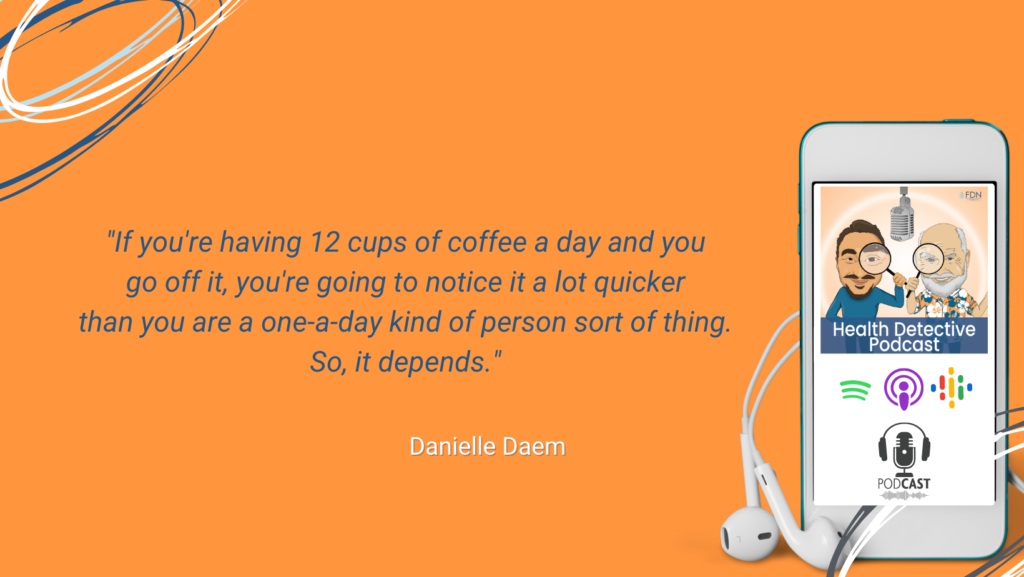
But if you’re not eating that much and maybe there’s less sugar in your life, then going off it a day isn’t going to be as big. If you’re having 12 cups of coffee a day and you go off it, you’re going to notice it a lot quicker than you are a one-a-day kind of person sort of thing. So, it depends.
[00:15:14] Detective Ev: Got it. I was curious because I mean, if it takes a couple of days, I’m absolutely in agreement then that no one would ever really do this without being intentional about it. I was kind of thinking like if someone, especially in our hustle bustle lifestyle, if someone’s not registering the idea that they may be addicted to sugar, this is just such a part of what they do.
They’re not even understanding that this is a real addiction that could cause real withdrawal symptoms. Okay, well, they’re just busy that morning. The kids were screwing around, and they had to get to work. Now they haven’t eaten in 12, 13 hours.
Trauma and Sugar: There’s a Promised Land on the Other Side of Withdrawals
Well, if you were addicted to a strong drug, you would know, okay, I’m addicted to this drug. I didn’t have it; this is why I feel like crap. Where I’m like, how many people walk around, if it can happen to some people, maybe real excess level sugar people, like 500 grams in a day? How many people do have these temporary withdrawal things and think it’s just a bad mood, or I’m tired, but really, they’re going through actual withdrawal? I’m kind of fascinated by that side of this.

The other good side about withdrawal is it really is like being sick. If you can help someone understand that when they’re going through that, it is a temporary thing. Your brain’s tricking you. You get through that and then there’s a promised land on the other side, you’re going to feel phenomenal. That’s worth it.
And I’m lucky, I was absolutely someone who met the diagnosis of substance abuse, but addiction was tough for me. It sounds so weird, but even with the harder drugs that I used when I was in high school, I would cycle them. It was crazy.
Like, I was aware of the danger of getting physically addicted to something that I couldn’t necessarily afford, but marijuana was always my thing. I would smoke that all day. Of course, I’m not going to insult anyone by acting like I went through some severe withdrawal by stopping weed versus someone that stops heroin. But it was strange.
Soul Searching
I found that as I started that journey of starting to stop, I needed to train my brain to realize, all right, Ev. Yes, the next three days, the sleep’s going to suck. You’re not going to feel a hundred percent good. But this too shall pass. Then on the other side of that, you will actually feel amazing.
You start to get level energy again. You have better sleep than you did before. It’s almost like you’re trading some temporary pain for this wonderful promise on the other side, which you experienced, you and your husband experienced.
How did you make the transition then eventually? I understand that it was pretty profound for you. But still, I mean, that’s a heck of a career switch. You went from this banking originally, no job, kind of traveling and stuff, to then doing this. When did you decide that I want to go do this, I want to help other people with this stuff?
[00:17:22] Danielle Daem: Such a great question.
For me it’s really just unfolded naturally. When I got back from that trip, we both actually had no idea what we wanted to do with our lives. I was doing a lot of soul searching. I was learning to meditate, and I was learning how to actually tune in and connect with my inner wisdom and my truth and what lit me up.
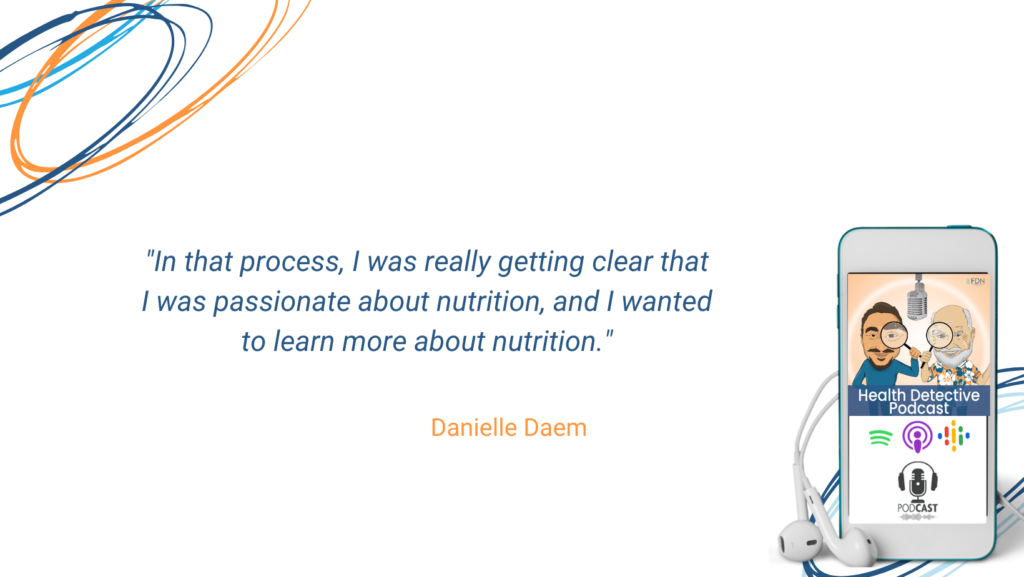
In that process, I was really getting clear that I was passionate about nutrition, and I wanted to learn more about nutrition. Within a couple months of getting home from that trip, I’d signed up for a yearlong nutrition coaching program. I was studying and learning nutrition.
Niching Down to My Sugar Addiction Story
I was having that inclination that, hey, I want to help people start eating better, building healthy habits, and start supporting them. I have this deep desire in me to help where people are struggling, and people are struggling with their health. So, that was a big calling.
I started working with clients at the beginning first two years helping more generally. Helping women make meal plans or helping them learn how to cook again and nourish their bodies, learn what felt right in their bodies, build healthy habits. I was kind of in that broad spectrum for the first few years.
About two years into that work and my journey, I finally got to a place with my relationship with sugar where I felt back in control. So, at the time of helping others, I was still dealing with my own stuff, right? I was still also growing and learning and trying to figure out what’s going on with these cravings and this addiction and this dependency that I have emotionally and physically and psychologically on this substance.
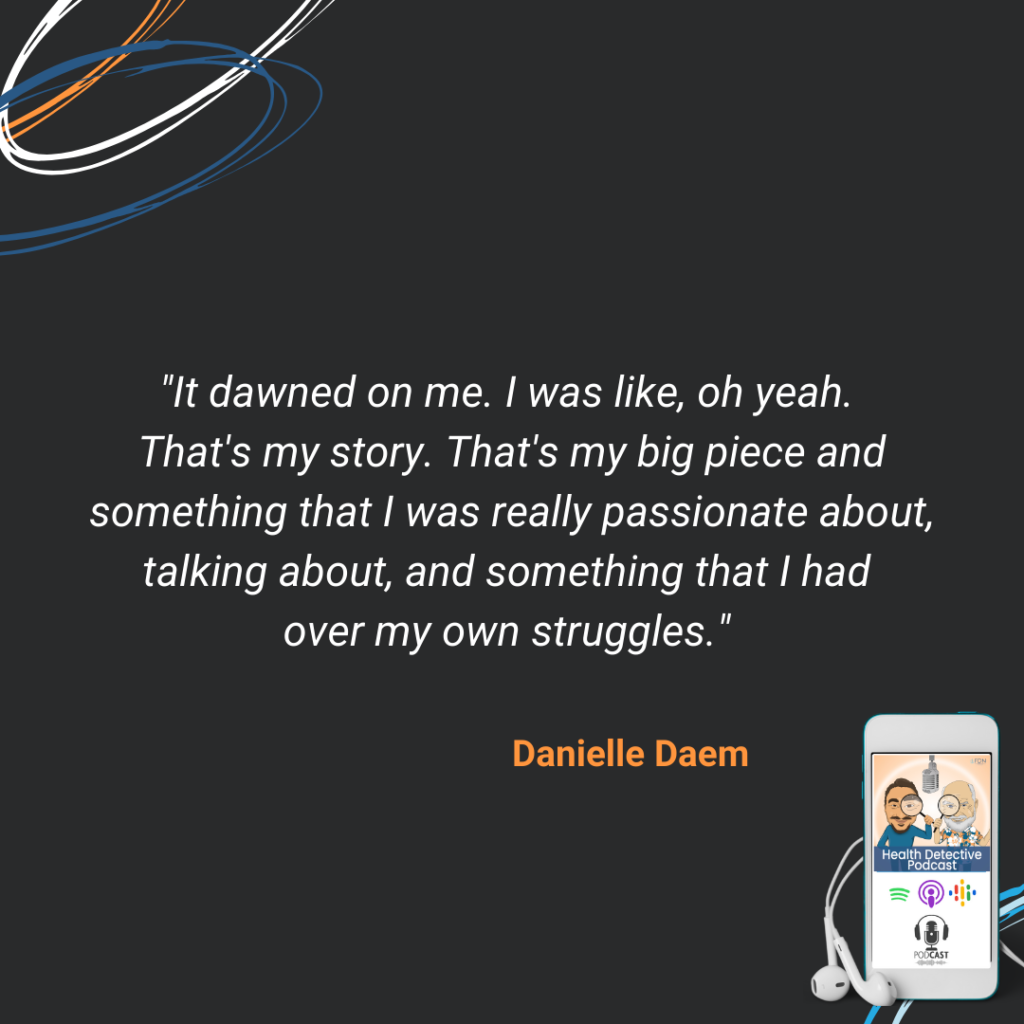
Once I finally got to that place, I actually had a good friend of mine, we were out for coffee somewhere. We were talking about niching down in business. She just looked at me and said, well, what about sugar? It dawned on me. I was like, oh yeah. That’s my story. That’s my big piece and something that I was really passionate about, talking about, and something that I had over my own struggles.
I’ll make this clear. I became aware that I had a dependent problem with sugar. It took me a good two, two and a half years to actually feel free from that and to actually get back in the driver’s seat.
Trauma and Sugar: The Journey is Full of Ups & Downs
I don’t abstain from sugar, there are reasons why. But I believe that we can get to a place of moderation and do the inner healing that we need to do to get there. It took me two and a half years to do that for many reasons. With no support, nobody around me, I was the black sheep in the family and didn’t have any community.
Honestly, I didn’t even know that I could go on Google and research “support with sugar”. I didn’t even know that was a thing or that other people were doing this. No one in my family had navigated this. So, I was kind of making a blueprint for myself starting from scratch.
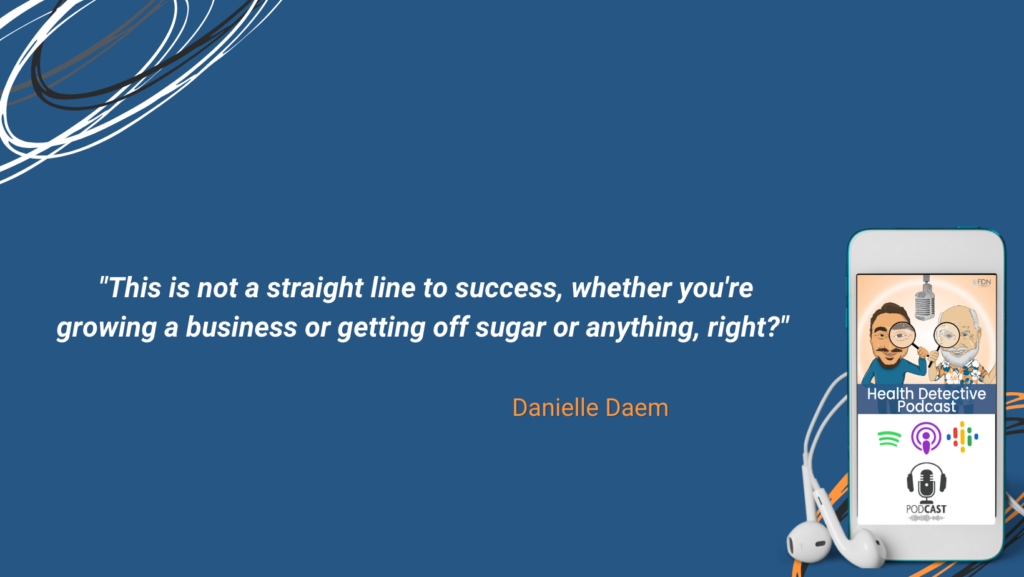
There was a lot of ups and downs and that’s really important for anyone who’s listening. This is not a straight line. This is not a straight line to success, whether you’re growing a business or getting off sugar or anything, right? It’s full of ups and downs and learning. So, that process took me a while.
And it was at that point that I finally really started solidifying that this was what I wanted to focus on and wanted to help women through, because it doesn’t have to take two years. I went through the gauntlet and came out with this strategy and this structure that I use now with my clients that really creates lasting change and doesn’t have to take two years. It doesn’t have to be lonely and as difficult as I went through. That’s where that real desire came from.
Helping Others While Still on a Healing Journey
That was about four years ago. Every year it’s deepening. My real deep purpose, I’m clearer and clearer on this every year, is really helping women uncover the real root causes, the reasons behind the physical addiction that are actually why we’re quote/unquote, “needing food to numb out” and to escape and to perpetuate, to get something. This inner healing and the inner work is really my jam. That’s what I really support my clients with now.
[00:20:40] Detective Ev: Cool. My gosh, you’re going to be preaching to the choir here. One thing I love that you already said is this idea that you were helping people before you were perfect, right?
I think a lot of our practitioners, because the nature of our company, Functional Diagnostic Nutrition, is that, generally speaking, people have been through the ringer with health by the time they get to something like this. So naturally, it isn’t going, even if you do everything right, it’s not going to take three months, six months to get perfectly to where you want to be.
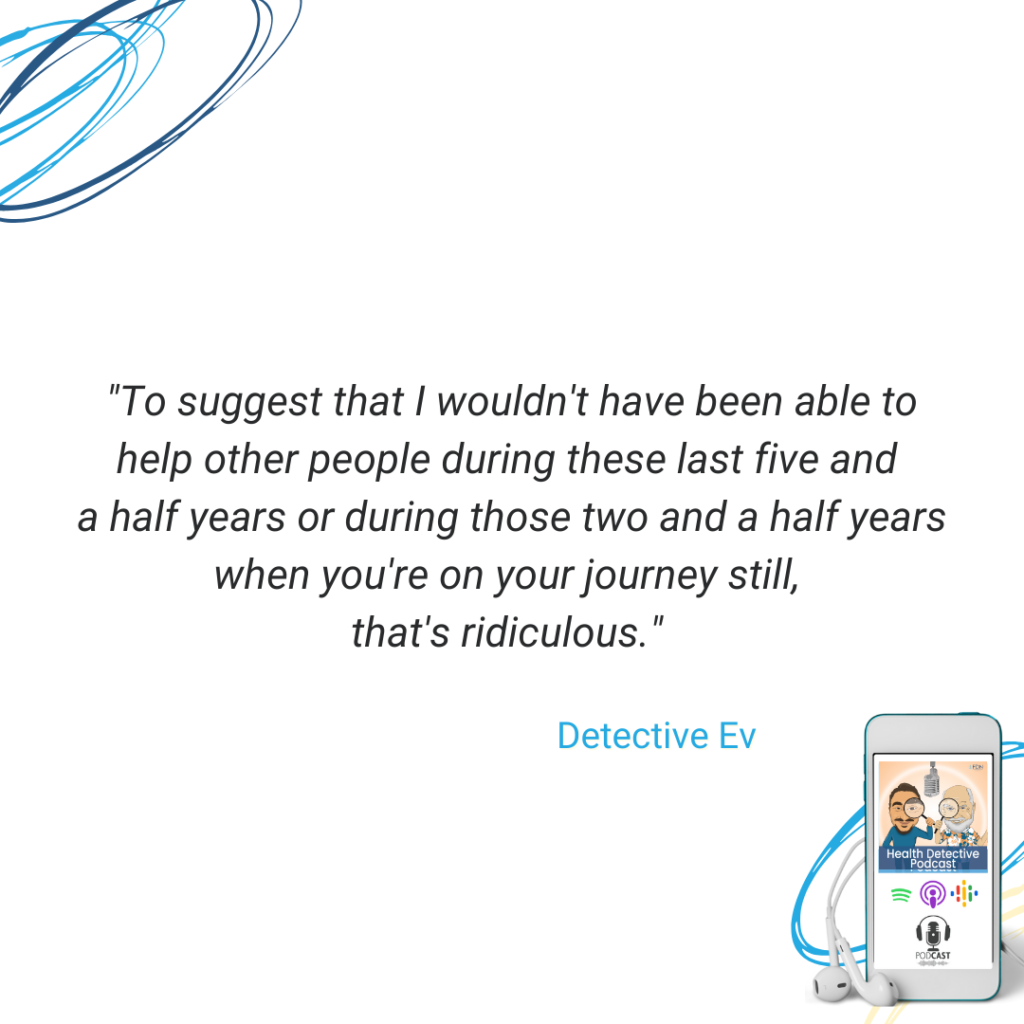
I would say I’m still reaping the benefits of the things that I’ve learned five and a half years later, where I’m getting physically stronger, I’m getting more athletic. That’s wonderful. I feel like I’m reverse aging sometimes, but that’s the point. It can take a while to really see all these things. To suggest that I wouldn’t have been able to help other people during these last five and a half years or during those two and a half years when you’re on your journey still, that’s ridiculous.
Trauma and Sugar: Sugar is Often Not the Core Problem
Clearly, you know more than someone out there. That is really the only thing that you need to be qualified to help someone else is do you know enough more than them to be able to support them in some way? That’s all it is, right? We don’t have to pretend to be perfect, that would be lying. But you could tell them where you’re at. Tell them how you could help them. I think that just makes a lot of sense.
One of the things I want to talk about is exactly like how we do help them in your case. I love that you mentioned already this kind of deeper side to this. This is conceptually similar to what one might support someone with if we’re talking about a drug withdrawal thing. I keep bringing this up cause I think it’s something many people can relate to. If it’s not in themselves, they’ve had it in their family, probably someone they know of has dealt with this.
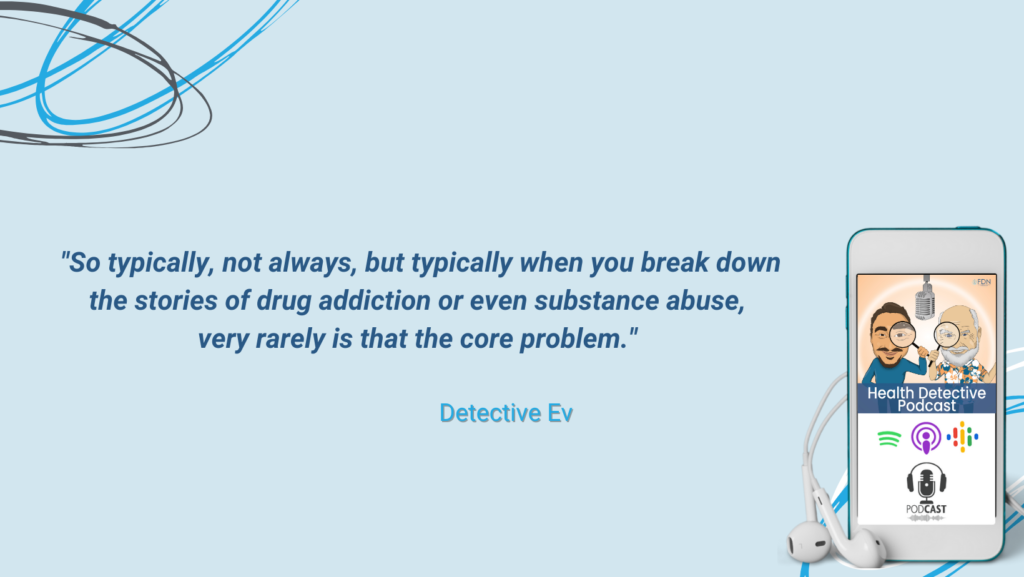
So typically, not always, but typically when you break down the stories of drug addiction or even substance abuse, very rarely is that the core problem. It is a piss poor solution to the core problem. There are those freak cases I’ve heard, maybe one out of a hundred, if I’m being honest, where someone was like, no, I was actually totally happy. I started doing the things that my friends were doing. I couldn’t believe how good it made me feel, and I just kept doing it. All right. Some brains are wired like that. I get it.
But more often than not, the person did not feel good to begin with. They started doing the other things that the people around them were doing.
Danielle’s Ideal Client
It was a quick, easy, and cheap sense of relief. It does work for a little bit until it doesn’t. I feel like this is very conceptually similar to the sugar thing. So, if I’m your client and I start working with you, what is the process? I guess an even better question before that is who is the ideal person that you work with? I already have this kind of picture in my head, but I’d love to hear it more explicitly from you.
[00:22:57] Danielle Daem: Thank you for that. I have so many things I want to say to this. Ideally, I work with women who are usually anywhere between 35 and actually 65. I actually have a client right now in one of my programs who’s 70, which is so inspiring. It’s so amazing to see women at any age doing this.
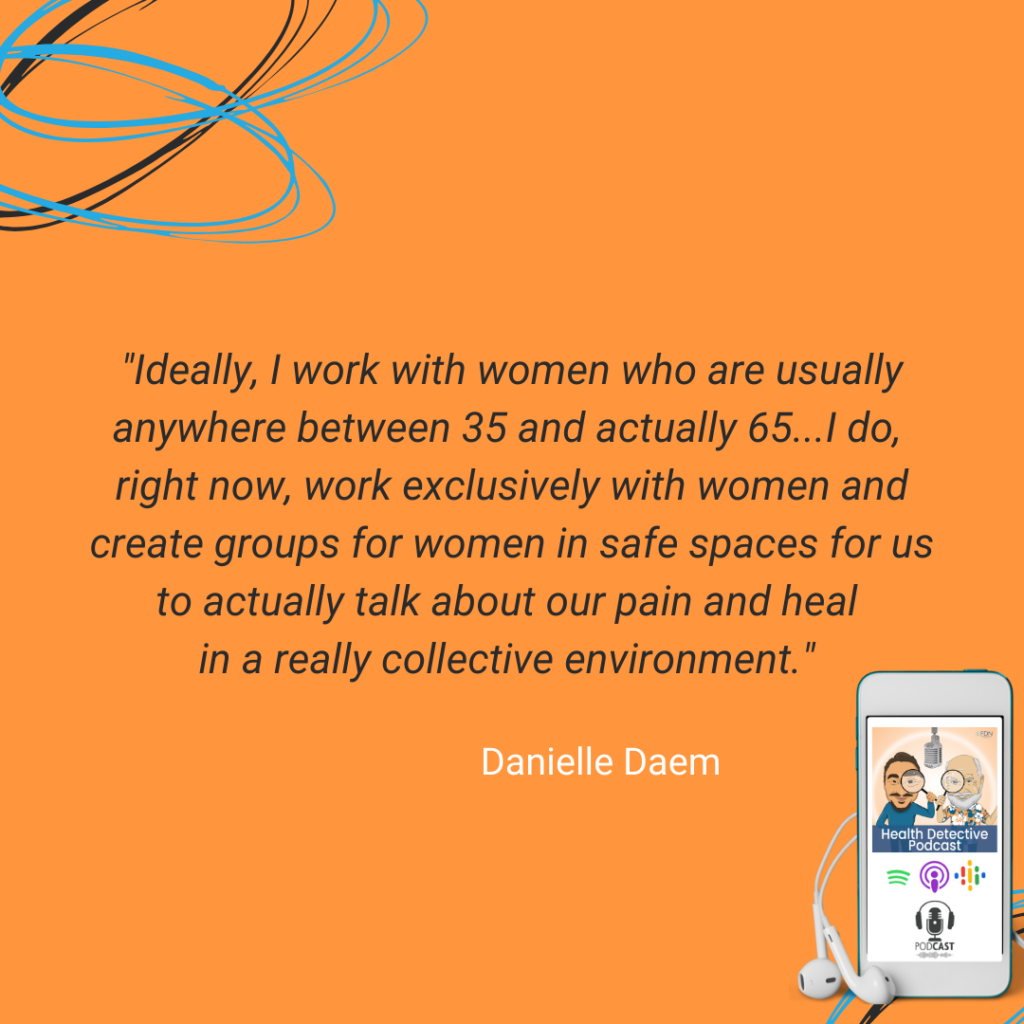
I do, right now, work exclusively with women and create groups for women in safe spaces for us to actually talk about our pain and heal in a really collective environment. This journey that I’ve understood, and I want to come back to what you said, cause I think this is so important.
One of the things that I really follow, and maybe you’re familiar with the work of Gabor Mate. You definitely need to go look him up. He is a prominent addiction specialist who’s worked here with drug and addiction in the downtown east side of Vancouver for decades. He’s quite well known.
He’s been studying addiction essentially his whole life. His angle, which I agree with and what I’ve seen, it totally parallels with our relationship with food and our addictions to food is this understanding that addiction is actually rooted in trauma.
Energetic Imprint as Children
The traumas, environmentally and experientially, that happened to us as children, whether it’s lack of love in a household, or a bigger event, actually shape the way that we feel and see ourselves and obviously shape the way that we think about the world around us.
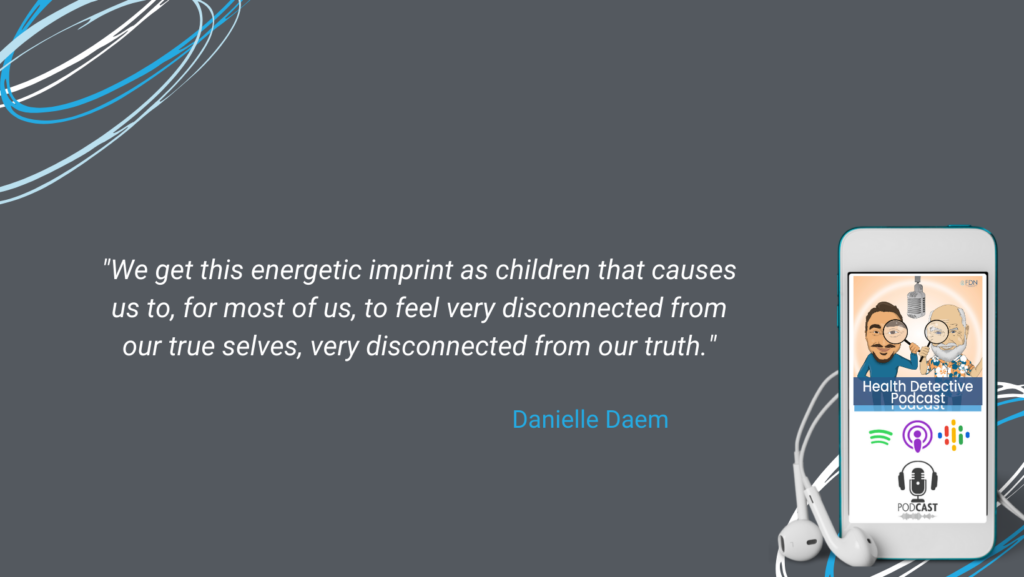
We get this energetic imprint as children that causes us to, for most of us, to feel very disconnected from our true selves, very disconnected from our truth. We’re taught to live in a box, to conform to society, and how to essentially not trust our bodies anymore.
You know, the world that we live in is very jarring for a human being whose basic needs are to be free and to be heard, to be seen and to be loved. The truth is most of us haven’t gotten those. We have some wounding, some patterning. Also, we can get into ancestral traumas and ancestral wounding that is passed down, that is now creating this environment within us where we don’t know who we are.
Actually, we don’t know how to be with and experience our emotions. This is a big area that I work with my clients, because most of us have been closed off. Feeling is not okay. Feeling and expressing emotions, especially as women, it means you’re weak.
Oh, as men as well, right? Like, don’t cry. You can’t cry. It’s not safe. That is really the generation that most of us were raised in, is this environment of be seen and not heard.
Trauma and Sugar: The Need to Escape
There’s this real energetic blueprint of not feeling safe in our bodies and not feeling safe to feel. We don’t know how to handle our pain or express our pain or anger in a safe way and know that it’s okay to have those emotions and those expressions of grief, sadness, anger, depression, anxiety, and all of these, what we would call negative emotions, which is a term I don’t use.
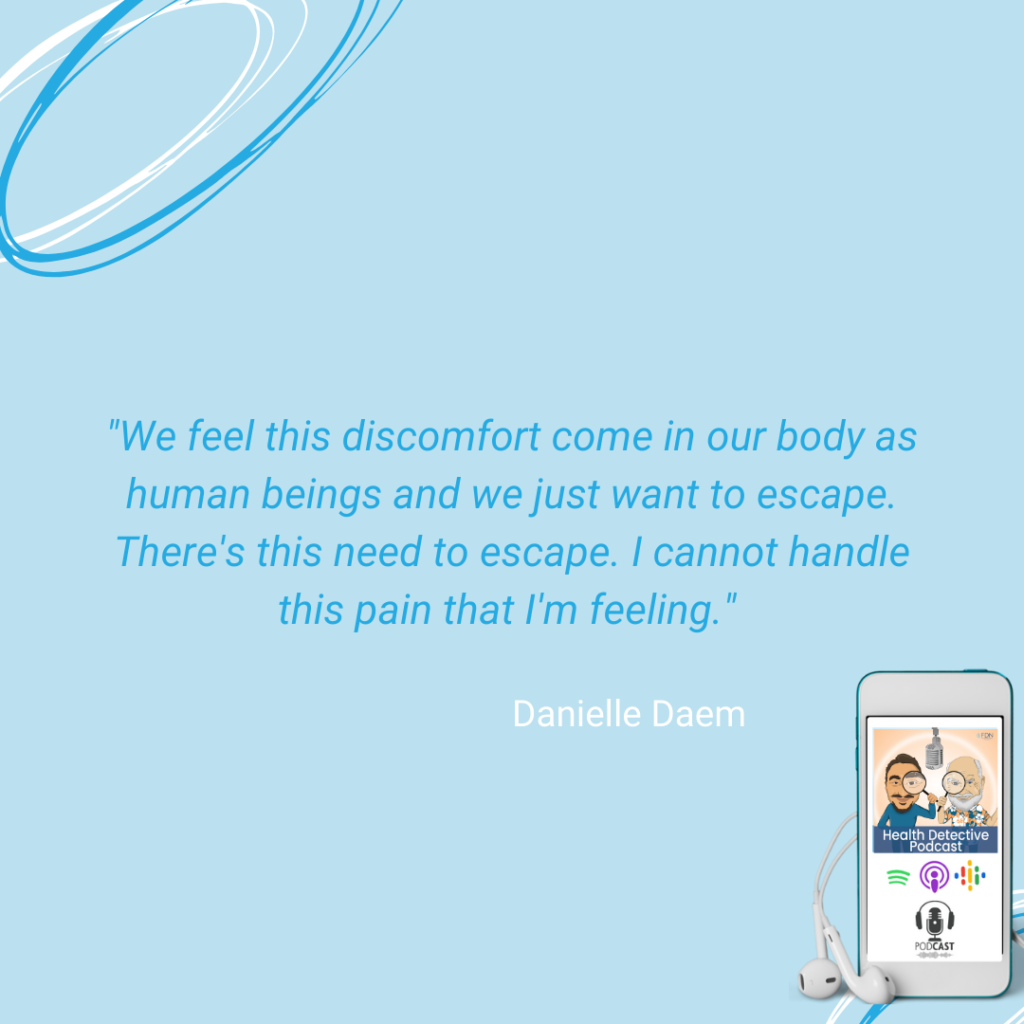
We feel this discomfort come in our body as human beings and we just want to escape. There’s this need to escape. I cannot handle this pain that I’m feeling. Enter the alcohol, enter the sugar, enter the heroin, enter the drug. I do not have the tools, and it is not safe in my body, therefore, I need a dopamine hit, right? I need to escape and get out of it.
This is a very survival mechanism. I really encourage anyone to go and look at Gabor Mate’s work. It’s really helped me draw a lot of lines between my own patterning as a child and how I wasn’t emotionally supported. How I used food to give me a sense of love and to give me a sense of feeling whole and just to escape this inner turmoil that I was dealing with cause I didn’t have any other tools.
This isn’t something we learn in our society, right? So, here we have a society that is just riddled with addiction problems, mental health problems. This is even bigger than just talking about sugar. This is a huge issue when we’re not actually supporting those who have lived through traumatic events.
To Be Free, Ask the Deep Questions
We all have trauma. I’m going to say that, we all have trauma, whether it’s little “t” or big “T”. We all have these imprints. We all have this trauma. Whether or not we’re willing to actually look at that and see how that created those neuro pathways and those patterns in our brain that are telling us every time we feel uncomfortable to reach for food, for sugar, or a drink, or cocaine, whatever it is.
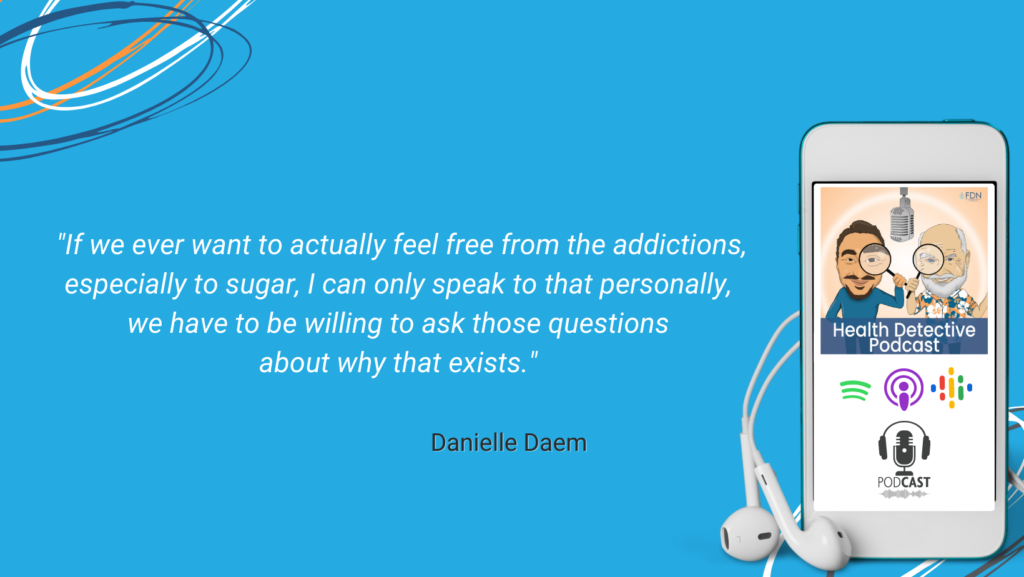
These patterns are very deeply rooted. If we ever want to actually feel free from the addictions, especially to sugar, I can only speak to that personally, we have to be willing to ask those questions about why that exists. Why does that dependency actually exist beyond the physical addiction?
[00:27:07] Detective Ev: Yeah. Are there any common themes? I obviously understand the concept of trauma, something that’s been brought up on the podcast many times. But I’m wondering if there’s any specific themes that you’re seeing commonly come up in the women that you’re working with.
I know trauma can come in many forms, but I’m wondering if there’s something that, more often than not, it’s like this type of relationship was missing or this event kind of happened, or is it just across the board? I mean, I could be wrong with this, it’s just a genuine question.
[00:27:31] Danielle Daem: I love this question.
There are definitely some commonalities. We all have unique brands of this, right? But some of the most common things that I’ve seen are, for most humans it’s this not actually getting our needs for unconditional love met. Maybe our parents are too busy or whenever we’re reaching for their support, they just push us aside cause they’ve gotta do all the things, right?
Commonalities in Energetic Imprints
We get caught up in a whirlwind of life. So, there’s kind of this being pushed away. There’s a lot of ways that that can kind of show up in just a child not feeling accepted for who they are. Parents may be trying to control or change or telling a kid, don’t do that. Do this. Like, this whole kind of shaping of well, maybe it’s not okay to be who I am. Or I’m not lovable. So, a lot of my clients are still carrying this core wound of I’m not lovable or I’m not worthy of love. This is a huge one.
Another one is around that emotional piece that I kind of alluded to earlier, and this is one of my unique brands is, my mom was not emotionally available. So, I never fully felt safe and connected to her because she had a lot of protectors and walls up and still actually does to this day. Maybe she’s listening to this podcast. She knows this, we’ve talked about it.

But you know, this energetic wall up as a young child, to me, meant I am not connected to this person who’s supposed to keep me alive. I don’t know if I’m safe, therefore I’m not safe. As an infant and a child, these energetic imprints of this human needs to keep me safe, that attachment needs to be there, emotionally, I didn’t have that. A lot of people, especially women, are walking around with this and the emotional piece of not feeling safe.
Like, it was not okay to express emotions in your home growing up. This is a big one. It’s not okay. It’s not welcomed, right?
Trauma and Sugar: Stuffing our Emotions & Trauma
And if you were ever angry or you misbehaved, you were told to go and deal with it on your own, which in itself is an act of trauma. When a child is having a difficult moment, whether they’re having a temper tantrum, or they’re angry, or they’re crying, that is the moment that they need love, they need support.
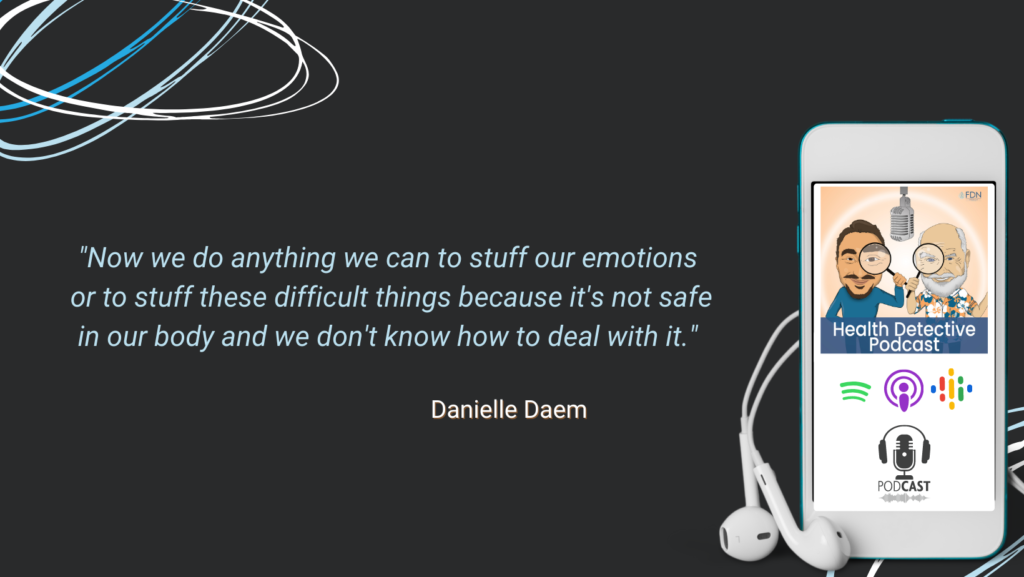
But our culture tells us to punish that child for having an emotional expression. We start to learn that that’s not okay, and it’s not safe. Now we do anything we can to stuff our emotions or to stuff these difficult things because it’s not safe in our body and we don’t know how to deal with it.
These are just a couple of the common ones. A lot of women I do work with as well have had some sort of sexual abuse or sexual trauma as well, which is huge. That’s the next level trauma when we need to reconnect to our body and release some of that.
[00:29:50] Detective Ev: Got it.
I wasn’t necessarily thinking about asking this before, but I could just tell you’re obviously well versed with the trauma side. I was thinking about this prior to you bringing up the sexual assault type of thing. With that dismissed, and I’m just focusing on the other things that we talked about, I’m someone who’s had to recognize certain things that happened in my past. So, I’m not dismissing trauma, that’s for sure.
But I kind of wonder the more and more I listen to the long never-ending list of things that could traumatize someone, I kind of start to wonder, at what point do we draw a line between trauma and life.
Trauma and Sugar: Being Alone in the Pain
This 3D reality that we are subject to at this moment in this body, it’s tough, man. I mean, I could be as happy as could be and could be driving down the highway tonight when my girlfriend and I have to go to this hotel, and we can get into a car accident. I’m not being pessimistic, I’m just saying, clearly this reality is intense.
Regardless of how you think we got here or where you think we’re going, it is intense. So, if I’m a listener, cause I’ve heard people say this, I’m more actually regurgitating a question I commonly hear, cause I don’t have an answer for it necessarily. I hear a lot of people say sometimes, and I think they are dismissing their own trauma, but that’s my opinion.
They will bring up this idea of like, at what point is this just life and we have to work through those things. How do you define that? What is the difference between actual trauma versus, hey, life’s just tough or do those intermingle and there’s a way to deal with it?
[00:31:04] Danielle Daem: I so love this question. This is so great.
I’m almost getting this feeling like, they are intermingled, right? Life is hard. We live in a very complicated time, and we’ve all grown up with difficult things happening around us and to us and for us. And I think the difference is how we support ourselves with those.

I love this definition. This is something that Gabor talks a lot about. The trauma isn’t the actual thing that happens, maybe your car accident or even the abuse, it’s being alone in the pain that’s the actual trauma.
Trauma and Sugar: Life is Traumatic
When we don’t have support, like deep support to navigate through life when it’s difficult, when things happen and we’re getting yelled at at the store around the holidays, I know some people have been talking about that lately, these things that can really impact. You know, if we don’t have a safe space to actually unpack it or talk about it or cry about it, or to actually release the energy that has been put on us in those moments, that’s where we get into actually, holding onto these traumatic events.
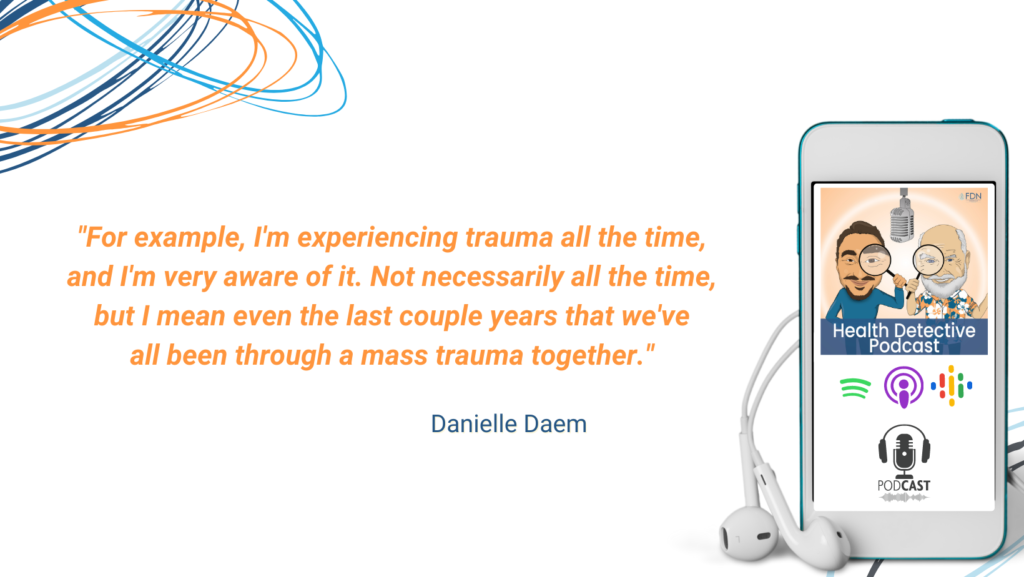
For example, I’m experiencing trauma all the time, and I’m very aware of it. Not necessarily all the time, but I mean even the last couple years that we’ve all been through a mass trauma together. I’m very aware of this. I’m like, okay, this is a trauma.
I lost my cat a few months ago, which to me was like losing a child. I’m very aware that that was a huge trauma for me. I’m very aware, I can come at it from understanding that this was a traumatic event, or this had a really big wounding effect on me and a very deep, deep wound. Supporting myself through that is about really honoring the emotions.
I’ve done a lot of crying, a lot of yelling, and a lot of grieving in this example specifically. And I’ve gotten a lot of support with people who are a safe space for me to unpack this and help me go into my body and somatically clear out the energy of that trauma.
I think, yes, life is traumatic. I’m going to say that, life is difficult, life is traumatic. I think they go hand in hand.
Trauma and Sugar: Trauma is Complicated and Nuanced
We all take events differently. Like somebody yelling at you in the grocery store may be traumatic because of your past and your old pathways and your challenges. But somebody might yell at me, and I don’t take it on energetically at all, it’s not a trauma for me.

So, I think, yes, trauma is such a hot word right now. It’s complicated and nuanced and there’s no black and white answers. We all have a different way of that showing up in our bodies. It’s dependent on the person. Is this a hard life situation or is this actually like a really big, traumatic piece that’s wounding me that I need to get support with?
[00:33:27] Detective Ev: I’m glad I asked that cause I liked your answer. I had a good feeling that this was something that you’ve thought about before and had something to say with it. I really appreciate that.
And I’m already connecting two different things. One is just sheer perspective on the event or events that occurred. I do speaking in schools, that’s what I do for the mental health stuff now. Every now and then, I’ve actually found it’s more teacher related than anything else. Some people will say demographics, some people will say the poverty level and those things do matter. But honestly, it’s how the teachers handle the kids that is the biggest indicator of the kids paying attention or not.
I went into a school; the teachers are completely out of control. They’re not listening. The kids aren’t listening to the teachers when they’re telling them to be quiet, let alone the guest speaker. I remember telling this to my girlfriend and she was very sympathetic. But she was like, oh my gosh, it’s gotta be so tough.
Trauma and Sugar: Trauma is Gauged by the Support Systems or Lack Thereof
I’m trying to ideally pour out a heart-wrenching story of mental health stuff and you have kids screwing around. But my perspective on it, and this is genuine, I never take offense to that cause I was the kid like screwing around. I just have such a vivid memory of, I didn’t know it was this at the time, but my brain not being developed enough to have the empathy for another human being sharing something serious in front of me.
I take zero offense. It affects me in no way emotionally when the kid’s screwing around in the back. I get that. I was that kind of kid and I’m actually glad that they don’t understand this cause that means they don’t relate to this. Otherwise, they’d be shutting up just like the kid in the front that I can tell is getting this a little too well. That’s one thing is the perspective on it.
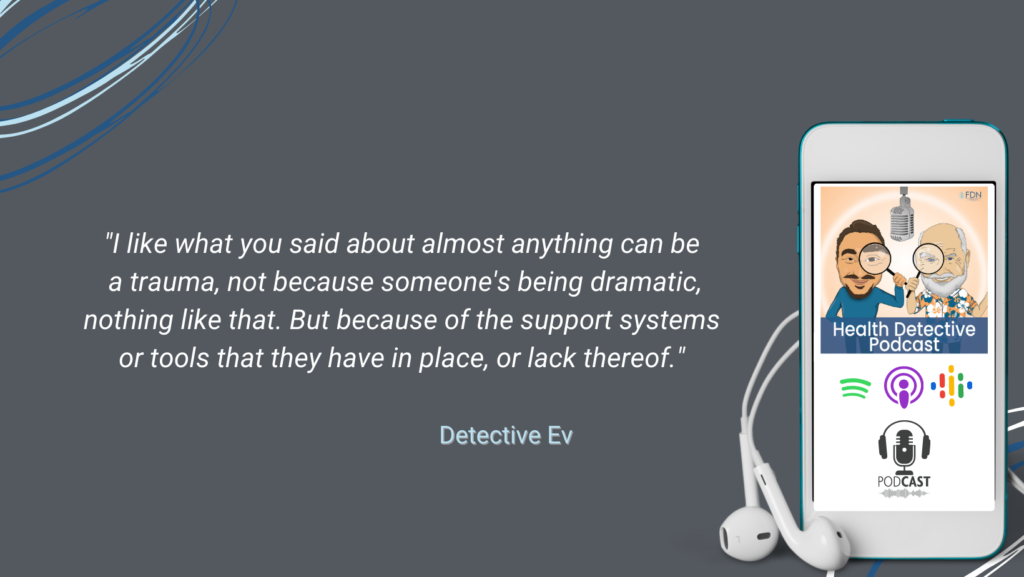
And then two, I like what you said about almost anything can be a trauma, not because someone’s being dramatic, nothing like that. But because of the support systems or tools that they have in place, or lack thereof.
I’m thinking of a good friend of mine, she lost a five-year boyfriend, very serious, clearly going to get married one day type of thing. She lost him to a car accident just like a year and a half ago. It was a good friend of mine as well. It was a wild thing to even hear, it’s one of those things you can’t believe, right? You’re like, wow, that just happened.
Supported Versus Not Supported
I am not saying this to not take an emotional toll of this person. But you know, she comes from nice little Christian family. They’re very deep in their faith and they’d always had a pretty good life. So, to see something like this happen, that is the true test of faith, regardless of what anyone’s faithful too. I’m like, wow, you people actually believe this. The way that she handled that situation!
I know me and I like to believe that I’ve built a lot of tools and I have a good support network now. I know for me, something like that, I don’t mean to be dramatic, but I’m just saying that is the one thing that could get me back to a place where I am contemplating, like taking my own life type of thing.
The strength that this woman exhibited to deal with such a situation like that was unbelievable. But I’m thinking about it. She has her faith, she has wonderful friends, she has a wonderful family. She can be open about these things. I’m realizing, yes, it’s not that it’s not traumatic. I’m sure that this has an effect.
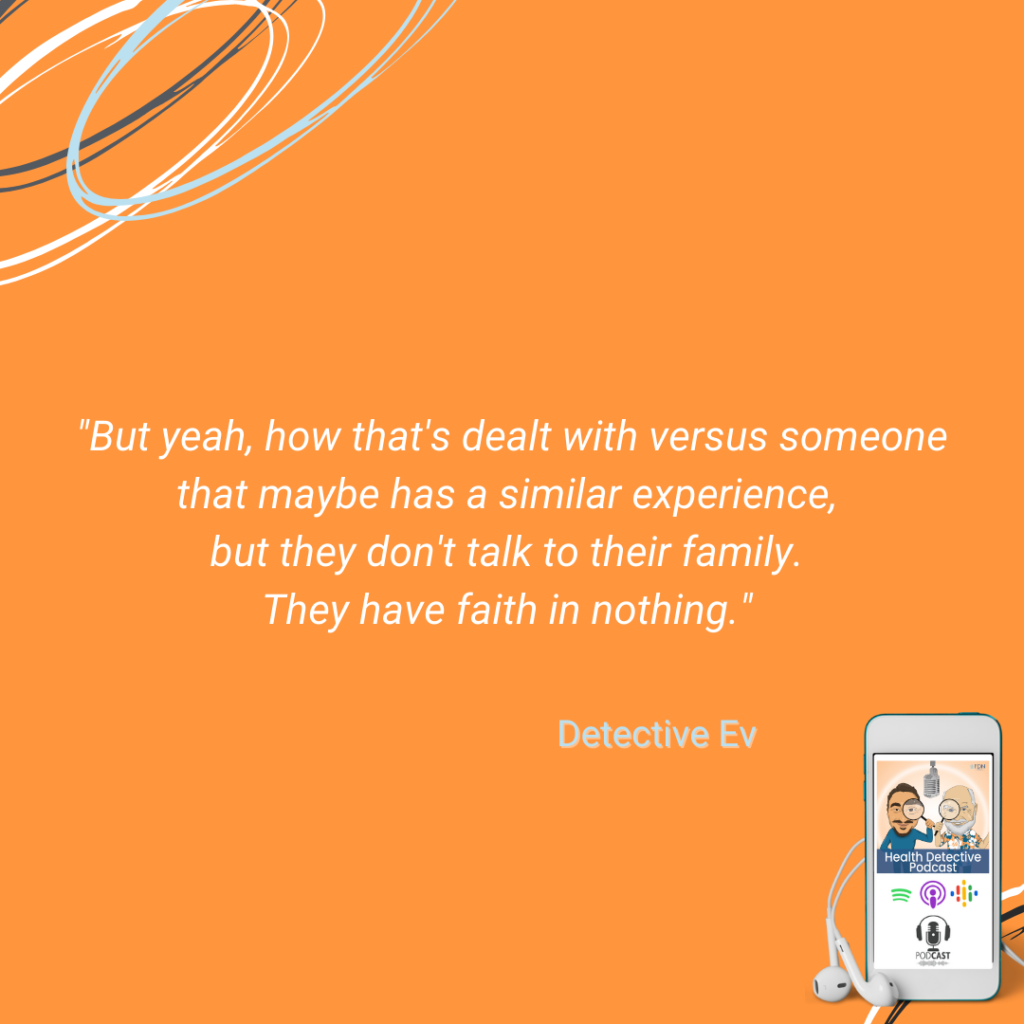
But yeah, how that’s dealt with versus someone that maybe has a similar experience, but they don’t talk to their family. They have faith in nothing and only have a couple friends. But they didn’t really know how to handle such a trauma. They do love them, but don’t really talk to her because you know how it can be weird when someone’s grieving, you don’t really know how to handle it. And you don’t want to upset them any worse.
Trauma and Sugar: Surrounded by People but Feeling So Alone
Now they’re completely isolated. And that situation becomes something that does lead to maybe a suicide attempt. Versus someone who, yes, they got affected greatly, but they are going to push through this. I have faith in my heart that she’s going to somehow use this to help other people in some way. It’s kind of amazing how that can happen.
I’m sorry to go off on such a long thing, but you really made me think when you brought up that idea of what do they have already in place to deal with the traumas that are occurring. Because that’s a severe situation and she handled it as about as good as anyone can handle it, that I know of.
[00:36:53] Danielle Daem: Can I add to that? Because what’s really coming up for me there, this is actually like very personally. What I’m still healing through is this deep, energetic imprint of being alone. Like at some point, this is another one of the pieces that we all, at some point in our life, might be experiencing, especially in childhood.
Maybe if your parents didn’t have time for you, or you didn’t really have that attachment to your caregivers that were keeping you alive. There’s this very big wounding of being alone. This has been really amplified the last few years for a lot of us, and really being ostracized and feeling alone. You know?
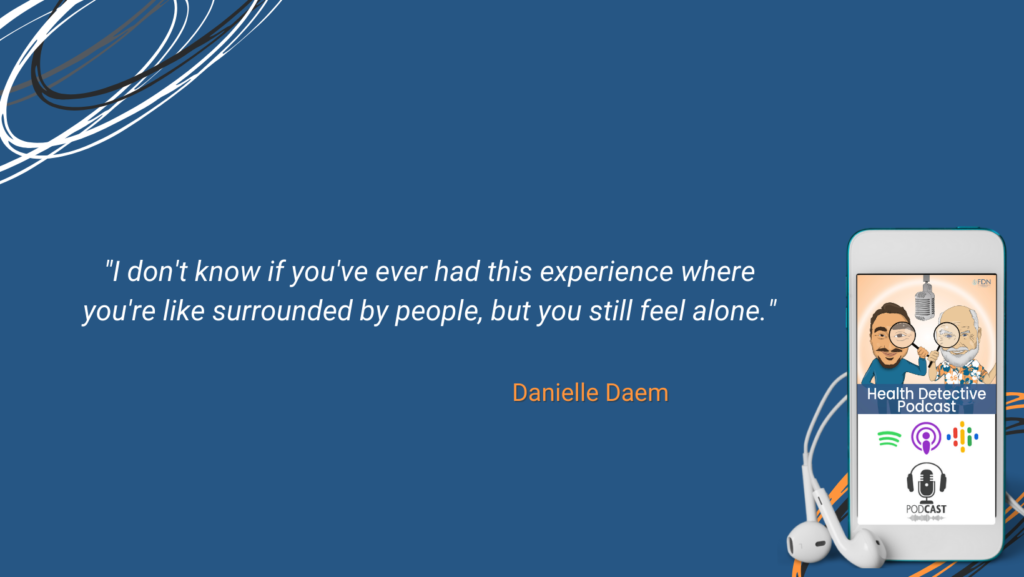
I don’t know if you’ve ever had this experience where you’re like surrounded by people, but you still feel alone. There’s a huge spectrum of connection. Like what is real connection and support versus superficial everyday kind of like connecting with your colleagues?
Trauma and Sugar: The Slippery Slope into Addictive Behavior
Those are the relationships that I used to have, friendships that were very surface level. I didn’t really fully feel seen. This is what I’m saying, and this is this big piece in this conversation is understanding that we need to have people in our life that really see us and unconditionally love us for who we are so that we can feel safe.
We need a safe space to, like your friend has going through this really horrible event, you know, obviously beautiful having her faith, which is very supportive and this group of people that she feels like she can talk to, or she can cry to or not feel judged, right?

Like, I am having a hard day today. The tears are pouring and really feeling held and maybe, hopefully, hugged a lot in that situation. These are the types of support networks that we are, most people, are missing. This is where when we start feeling that deep sense of loneliness. This is where it’s that quick slippery slope into addictive behavior, into contemplating suicide. When we feel so disconnected from society and those around us, that is when those things start to really come into play.
[00:38:40] Detective Ev: This is interesting, it’s an odd example, but if people listen to the whole thing, they’ll get what I’m saying here.
My family on my dad’s side is very large, a lot of people, a lot of little cousins, aunts, uncles, everyone’s hanging out. We had an aunt pass away just a couple years ago now from brain cancer. She passed away and of course it’s a sad thing, I’m not saying that. But I couldn’t believe what would happen when we got together for these memorials or the funerals or whatever.
Trauma and Sugar: Grieving Together or Ignoring Emotions
I’m always the weird one, looking at this from the outside type of thing. I’m amazed how well everyone’s handling it, because it’s not that they don’t care. Everyone loves this person. But the ability for them to deal with this type of thing. The core thing seemed here like, yes, everyone’s having a few drinks, they’re eating some crappy food. I’m like, that’s not what’s leading to this though right now. What’s leading to this is the family unit, the cousins and all these things.
Do you find that that loneliness is a core component in the people that you’re working with? Because I felt like there is something that the tribal thing does that prevents us from dealing with devastating effects of loss, it seemed to me at least. Cause I had never seen anything like that. I thought that was interesting.
Is loneliness a key component in a lot of your clients?
[00:39:51] Danielle Daem: Absolutely. I have to add to that cause I would be very curious.
I totally agree with what you’re saying. When we have the right type of open, connected, support network in a tribe situation, in a family, and we’re all going through a loss together, that’s a really, really important part of the grieving process. What I see more than not is these family units coming together.
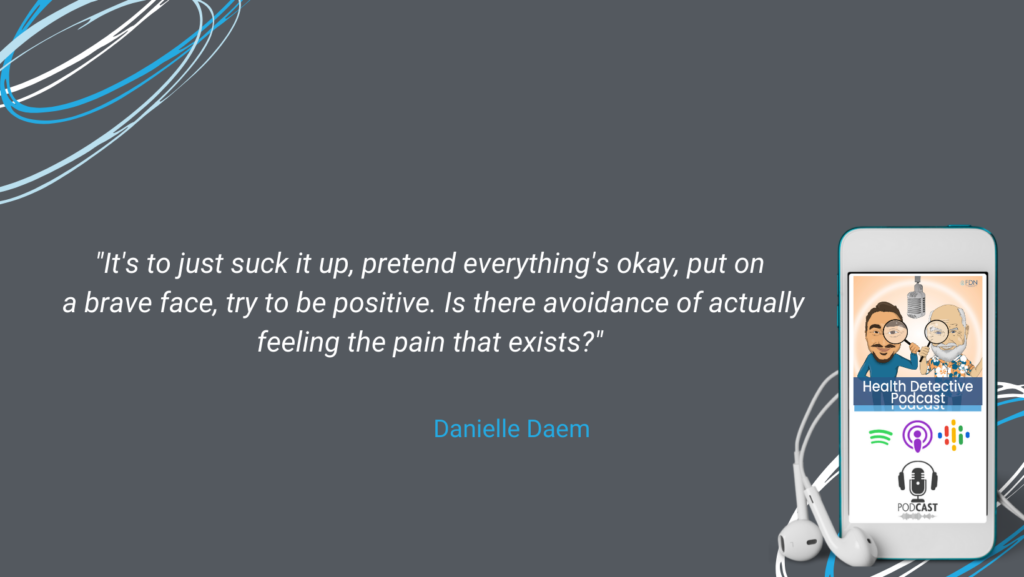
I would be curious, in your situation, only you know this obviously, that the patterning in that family is to ignore emotions, right? It’s to just suck it up, pretend everything’s okay, put on a brave face, try to be positive. Is there avoidance of actually feeling the pain that exists?
Saying “I Love You” is Like Pulling Teeth
There’s a fine line between like, we’re all just going to pretend it’s okay and have some drinks and celebrate auntie versus actually being together, being sad together, allowing that and supporting each other in the hurt that is going to come up. There’s a fine line between avoidance and acceptance of that.
[00:40:45] Detective Ev: You, my friend, are an expert in your craft. I think that proves it.
I’m trying to think about this from an outsider’s perspective. If you know nothing about this topic, there is nothing that I said to indicate that what you just suggested is correct, and yet you are correct. That side of the family has historically been one that even though they are close, and everyone clearly loves each other, one of the things that my dad had always talked about is they don’t say, I love you.
Even my grandmother, who is a sweet little old lady. This isn’t some like tough grandmother. This is a sweet old lady who doesn’t even like really like driving by herself cause she’s afraid of driving. It’s someone that you naturally want to have that connection with and just kind of take care of her. It’s like splitting hairs to get her to say this first.

So, that is an astute observation. Not even an observation cause you don’t know that yet necessarily, but an astute question, a suggestion, right? Like, hey, is this actually going on? Because yes, that family, as close as they are, as much as they do care, there has been, historically, those problems of we can all hang out and everyone can drink together but the “I love you”, that is like pulling teeth with some of those people there.
So very interesting that you discussed that.
Trauma and Sugar: Different Levels of Closeness
[00:41:50] Danielle Daem: Not to make you feel any less special, but I said that because this is most family units. This is literally how most people and every one of my clients have been raised in this type of family and myself as well.
Even in my journey, I really do, even to this day, I’m thinking about my in-laws who I’ve been in their life 14 years. And my family, oftentimes, like, I deeply feel like they don’t really know who I am. They don’t really know the true Dani, the deep spiritual, like this deeper part of me. And I’m okay with that cause I have other people in my life who do know that part of me and can actually understand and comprehend me in that space and in my true essence in that way.
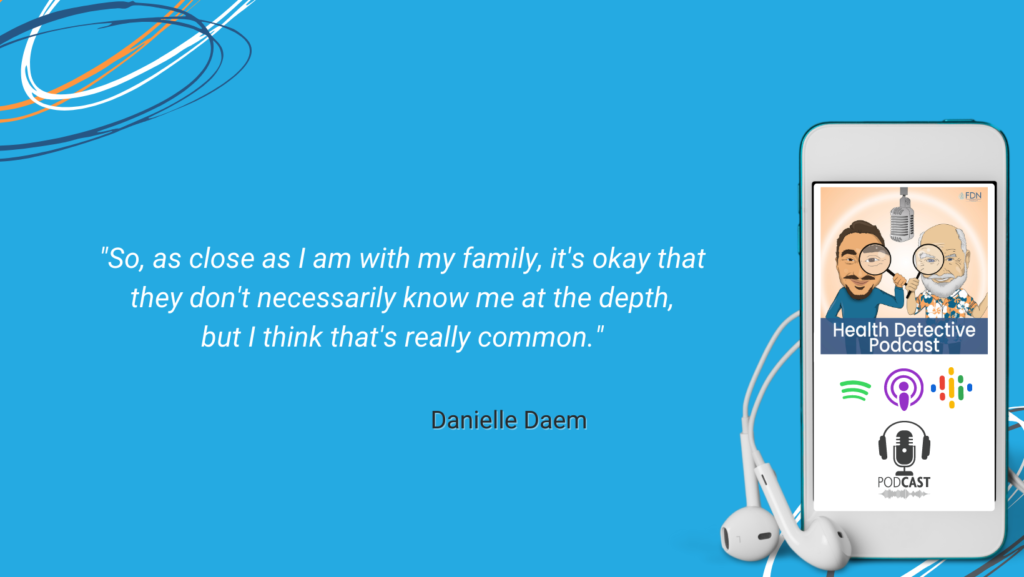
So, as close as I am with my family, it’s okay that they don’t necessarily know me at the depth, but I think that’s really common. It’s like, we can feel close to our family, but I think there’s a very different level of closeness that comes through vulnerability and pain.
A lot of families are in this, let’s just always have fun together mode. That doesn’t necessarily create that depth of closeness and connection without the deep vulnerability and being seen in your worst places, being seen in your ugliest spaces, you’re angry, you’re sad, all of the myriad of emotions. Being able to actually hold each other in that space is really sort of that next level of connection. It’s really common.
Actively Re-patterning and Reaching Out for Support
[00:43:09] Detective Ev: I still think that there’s probably something to this idea of human connection that makes these things more easy. But that’s very interesting what you’re saying and it’s changing my perspective. There’s a difference between helping each other versus hiding with each other and distracting with each other.
[00:43:23] Danielle Daem: I’ll give a simple example of this just recently for me in the passing of my little kitty. I reached out for support cause now this is a skill that I’m learning. I know that I’m not going to go through this alone, even though it feels really painful and I kind of want to hide and not tell anybody.
This was something that I was very aware of. This is me re-patterning how I actually get the support that I need to not go through this alone. I reached out to my mom, and I didn’t feel the support that I needed in various ways because I know that she didn’t just have the capacity emotionally to be with me in my pain. She still has her emotional walls up.
Versus my other friend who came right over and is crying with me. She is crying with the loss with me. We’re holding each other and we’re just ugly crying together. That is a small nuance of, can we be in this together? That’s where I think that collective community, obviously, when you really feel in pain together and you know that the other person is feeling it maybe at a different level than you, but still feeling it with you.

That, to me, feels like that really wonderful level of, I’m not alone in this. And I’m deeply supported here.
Trauma and Sugar Really Do Connect Together
[00:44:27] Detective Ev: Totally makes sense. I think this is simple then for me at this point. So, the family dynamic that I was talking about on my dad’s side would be kind of this distracting version. Whereas that friend that I was talking about who lost her, probably soon to be fiancé at the time, that is real, yeah, ugly cry. Like we are dealing with this together.
I guess the bittersweet side was that the person that she was with was so close to so many of her friends and her family, like lived at the house four or five days out of the week. It’s impossible not to go through it together to some degree. Very interesting kind of noticing those differences now.
Obviously, we’re almost at 50 minutes, but I want to steal a few more minutes of your time, if I may, just to make sure we cover everything in your business of course.
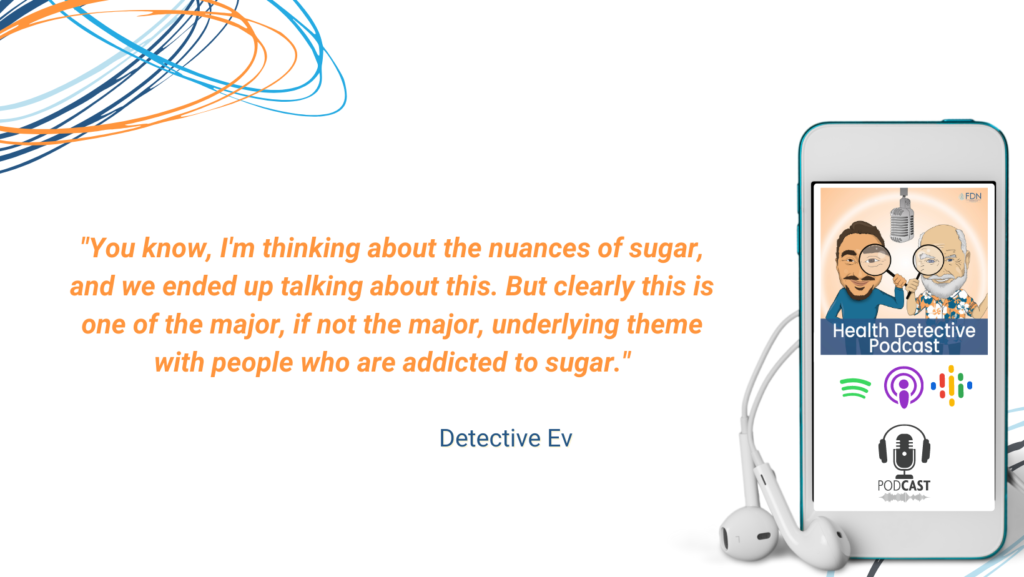
Let’s begin with where can people find you? We touched on a lot today, and it’s interesting. I didn’t necessarily expect it to take this route when we first started. You know, I’m thinking about the nuances of sugar, and we ended up talking about this. But clearly this is one of the major, if not the major, underlying theme with people who are addicted to sugar.
So, where can people find you if they’re like, I love this person. I want to work with them. They really get this for me. Where can they find you and what do you offer specifically?
[00:45:31] Danielle Daem: Before I answer that, I have to comment on what you just said. I think that is often what my clients come and say to me.
Trauma and Sugar: Where to Find Danielle Daem
They’re like, I came to talk about food and sugar, why are we talking about all this other stuff, what’s going on? The thing that I always say is really just understanding that our relationship with food is a direct example or a relation of our relationship with ourselves. It’s just a mirror of our relationship with ourselves.
We can try to abstain from sugar, do a 30-day detox, try to make all these habits and changes in our life on the surface level, but if we don’t get to the foundation, actually get into what is going on with our relationship with ourself and our beliefs, nothing’s actually going to change in the long run. You’re not going to make any lasting change.
You’re going to be on this roller coaster with sugar, with food, with guilt and shame your whole life. This is what I do and why it’s so unique, especially in the sugar addiction space. Getting curious about the deep inner wounds and healing from the inside out so that we can essentially repair our foundation, be strong, connected, grounded, love ourselves, and be confident in ourselves, speak our truth and set healthy boundaries, all of these really empowering things. That ultimately affects how we want to naturally nourish ourselves with healthy foods.
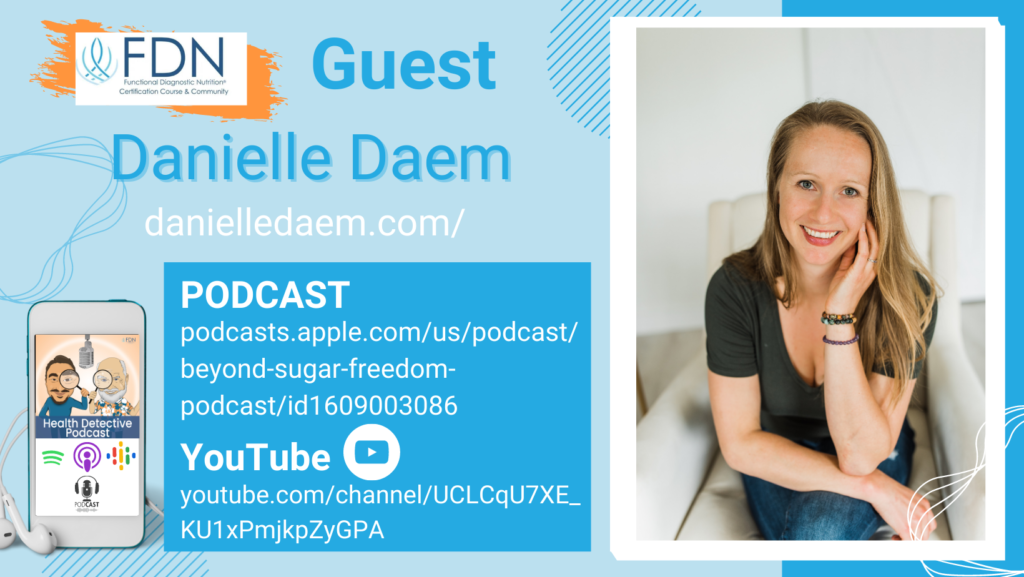
I would love to connect with any of your audience members. A really great place to come and start is to listen to my podcast. It’s called the Beyond Sugar Freedom Podcast. I had Reed on recently, which was really exciting.
Then you can come and find me on my website, danielledaem.com. I’m on Instagram and Facebook as well. Same Danielle Daem links as well.
Those would be the best places to connect with me, for sure.
Trauma and Sugar: Group Settings is Where Healing Happens
[00:46:58] Detective Ev: In terms of clients, do you do one-on-one group? Both?
[00:47:01] Danielle Daem: Actually, I don’t do one-on-one anymore unless it’s within the container of my group. I do host group programs; I do a few a year, a couple different ones every year. Also, I have a monthly membership community for my clients after they’ve done one of my programs. So, we are ongoing supporting each other.
The truth of that, I want to be really honest with this cause this was a shift I made last year and this kind of sounds funny coming from a coach, I realized that we don’t heal one-on-one. We heal in community. A lot of all the women that I work with have been wounded around being in other groups of women, not being heard, not being seen, not feeling safe to share.

So, creating these really safe spaces to talk about our pain and navigate our deepest wounds and most shameful parts is a really, really important part of our healing journey. We just can’t do that one-on-one. That’s something that I really started taking away from my practice because I feel like it’s doing a disservice to my clients. In that group setting is actually where the healing happens. That’s my passion now is really seeing that and supporting in that way.
[00:47:59] Detective Ev: I would back that up. I’ve either been involved in the planning of, or even directly hosted retreats of several different types, all focused around health and healing to some degree. It’s just a little different. First of all, I was amazed by how you feel during those things, cause it instantly makes you realize that all the stuff, the technology, the fast foods, all bs.
Health Detective Podcast Signature Question – Connect with Yourself
All we ever needed was other good human beings who have our best interest and they’re actually decent and care about us. Most of them are that really at the core. When I realized that, I was like, wow. This is how these things can happen quick. So, I definitely agree with you with that.
My final question for you is the signature one on the podcast. This is interesting cause you have a lot of different things that you’ve done and approaches that you take.
If we could give you a magic wand and you could get every single person in this world to do one thing for their health, whether that’s actually get them to do one thing or alternatively you could get them to stop doing one thing, what is the one thing Dani would get them to do?
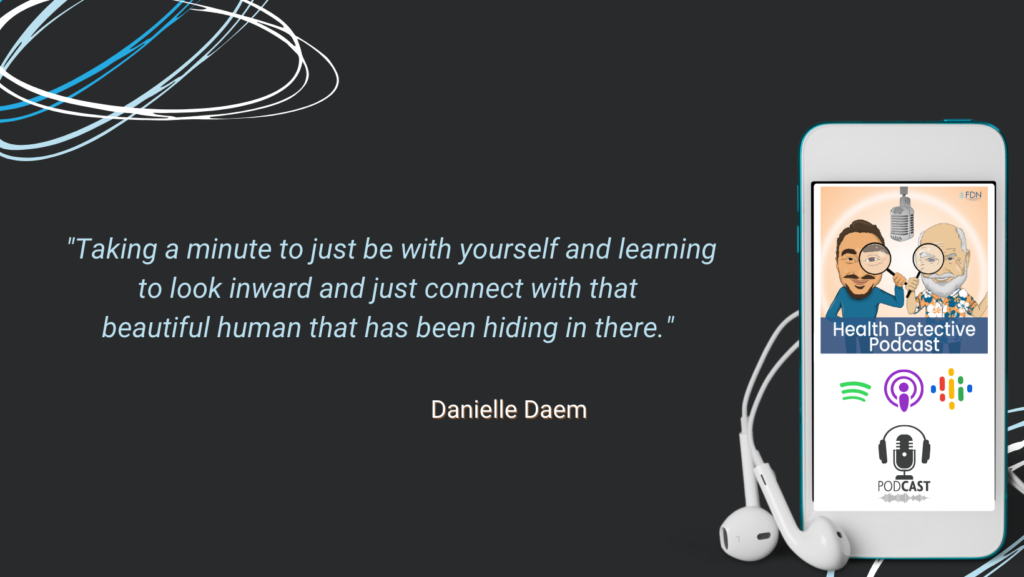
[00:48:54] Danielle Daem: Ooh, okay. Trusting my intuition here, the first thing that came to me is getting them to spend time every day just connecting with themselves. Taking a minute to just be with yourself and learning to look inward and just connect with that beautiful human that has been hiding in there.
[00:49:11] Detective Ev: Awesome. Thank you so much for coming on. This was great.
[00:49:13] Danielle Daem: Thank you so much for having me. This is such a fun conversation. You asked some really great questions that I really appreciate.
Consider Leaving a Five-Star Review
[00:49:20] Detective Ev: All right guys. That’ll do it for today’s episode with Danielle Daem. I hope that you guys did enjoy this one, and you understood what I meant in the beginning when I said, this is kind of a unique episode. This really isn’t like the ones that you might expect when we’re talking about sugar or trauma.
It’s not even the people’s fault necessarily. I just think they’re so overdone that it’s tough to hear unique content or something that really engages you when you might have heard it before. I don’t know if I’m just being too personal because maybe there were certain things that she said that I found relatable, but I thought she nailed this one today.

If you guys liked it, please consider leaving us a five-star review on Spotify and or Apple. Even more importantly though, reach out to her, tell her that you liked the episode. We would appreciate that. I think she deserves it.
With that said, I will be back soon, very soon, with another episode that will be a continuation of our 200th episode special. I’m excited to bring that one to you guys.
Just a heads up, if you are still listening to the podcast right now, of course we will be taking a little bit of a break for the holidays. We are United States based and Christmas is a major holiday in the United States. We will be taking the day off from posting. After that, December 26th and New Year’s Day, we will not be posting either. But we are still here with you, ready to bring some great new content in 2023.
Conclusion
Thank you, guys, so much. We will talk again soon.
You are always welcome to visit us at functionaldiagnosticnutrition.com.
To hire a coach, go to fdnthrive.com.
For a FREE Health Review, go to fdnthrive.com/match/.

